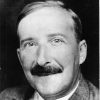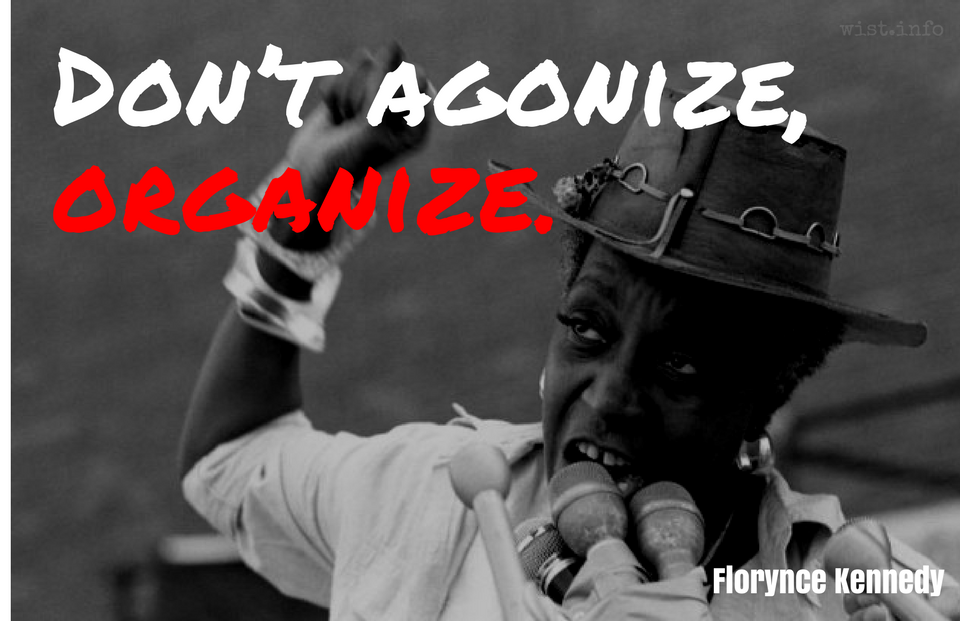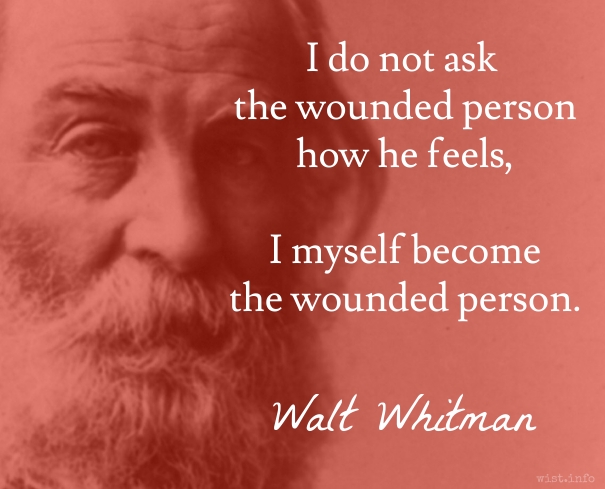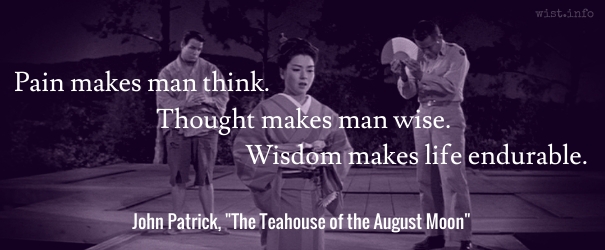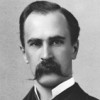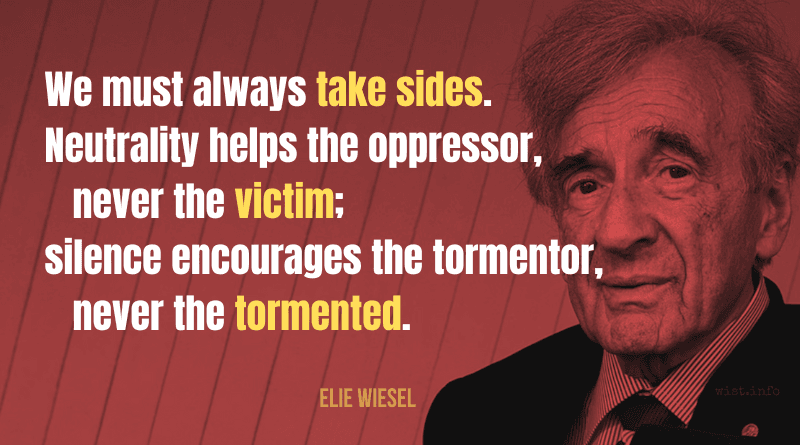The true source of our sufferings, has been our timidity.
John Adams (1735-1826) American lawyer, Founding Father, statesman, US President (1797-1801)
Essay (1765-09-30), “A Dissertation on the Canon and the Feudal Law,” No. 3, Boston Gazette
(Source)
Quotations about:
suffering
Note not all quotations have been tagged, so Search may find additional quotes on this topic.
MALCOLM: I think our country sinks beneath the yoke.
It weeps, it bleeds, and each new day a gash
Is added to her wounds.William Shakespeare (1564-1616) English dramatist and poet
Macbeth, Act 4, sc. 3, l. 49ff (4.3.49-51) (1606)
(Source)
Speaking with Macduff on the tyranny and bloodshed unleashed by Macbeth.
In a valiant suffering for others, not in a slothful making others suffer for us, did nobleness ever lie.
Thomas Carlyle (1795-1881) Scottish essayist and historian
Past and Present, Book 2, ch. 8 “Unworking Aristocracy” (1843)
(Source)
So long as little children are allowed to suffer, there is no true love in this world.
ADRIANA: A wretched soul bruised with adversity
We bid be quiet when we hear it cry,
But were we burdened with like weight of pain,
As much or more we should ourselves complain.William Shakespeare (1564-1616) English dramatist and poet
Comedy of Errors, Act 2, sc. 1, l. 34ff (2.1.34-37) (1594)
(Source)
Foolish people, I say, then, who have never experienced much of either, will tell you that mental distress is far more agonizing than bodily. Romantic and touching theory! so comforting to the love-sick young sprig who looks down patronizingly at some poor devil with a white starved face and thinks to himself, “Ah, how happy you are compared with me!” — so soothing to fat old gentlemen who cackle about the superiority of poverty over riches. But it is all nonsense — all cant. An aching head soon makes one forget an aching heart. A broken finger will drive away all recollections of an empty chair. And when a man feels really hungry he does not feel anything else.
Jerome K. Jerome (1859-1927) English writer, humorist [Jerome Klapka Jerome]
Idle Thoughts of an Idle Fellow, “On Eating and Drinking” (1886)
(Source)
I could no longer reconcile the claims of faith with the facts of life. In particular, I could no longer explain how there can be a good and all-powerful God actively involved with this world, given the state of things. For many people who inhabit this planet, life is a cesspool of misery and suffering. I came to a point where I simply could not believe that there is a good and kindly disposed Ruler who is in charge of it.
This is that same Foulon named âme damnée du Parlement; a man grown gray in treachery, in griping, projecting, intriguing and iniquity: who once when it was objected, to some finance-scheme of his, “What will the people do?” — made answer, in the fire of discussion, “The people may eat grass”: hasty words, which fly abroad irrevocable, — and will send back tidings!
Thomas Carlyle (1795-1881) Scottish essayist and historian
The French Revolution: A History, Part 1, Book 3, ch. 9 (1.3.9) (1837)
(Source)
Writing of Joseph-François Foullon de Doué (1715-1789), French politician, the "damned soul of the Parliament," and a Controller-General of Finances under Louis XVI. Widely hated by "the people" for such statements and actions, he was one of the early targets of the French Revolution, as told in Dickens, A Tale of Two Cities. He was marched from his country hiding place back to Paris, with the mob shoving grass and hay into his face and mouth. He became the first recorded person to have been lynched from a lamp post. (The rope broke three times, so he was instead beheaded and his grass-stuffed head marched about on a pike.)
If there is an all-powerful and loving God in this world, why is there so much excruciating pain and unspeakable suffering? The problem of suffering has haunted me for a very long time. It was what made me begin to think about religion when I was young, and it was what led me to question my faith when I was older. Ultimately, it was the reason I lost my faith.
Bart D. Ehrman (b. 1955) American Biblical scholar, author
God’s Problem, ch. 1 “Suffering and a Crisis of Faith” (2008)
(Source)
But not only creativeness and enjoyment are meaningful. If there is a meaning in life at all, then there must be a meaning in suffering. Suffering is an ineradicable part of life, even as fate and death. Without suffering and death human life cannot be complete.
Viktor Frankl (1905-1997) German-American psychologist, writer
Man’s Search for Meaning [Trotzdem Ja zum Leben Sagen], Part 1 (1946) [tr. Lasch (1959)]
(Source)
Life is truly known only to those who suffer, lose, endure adversity, and stumble from defeat to defeat.
Ryszard Kapuściński (1932-2007) Polish journalist, photographer, poet, author
“A Warsaw Diary,” Granta Magazine, No. 15 (1985 Spring)
(Source)
Perhaps I know best why man alone laughs: he alone suffers so deeply that he had to invent laughter.
[Vielleicht weiss ich am besten, warum der Mensch allein lacht: er allein leidet so tief, dass er das Lachen erfinden musste.]
Friedrich Nietzsche (1844-1900) German philosopher and poet
The Will to Power [Der Wille zur Macht], Book 1, Part 2, ch. 2/b, § 91 (1901) [ed. Elisabeth Förster-Nietzsche] [tr. Kaufmann/Hollingdale (1967)]
(Source)
(Source (German)). Alternate translations:Perhaps I know best why man is the only animal that laughs : he alone suffers so excruciatingly that he was compelled to invent laughter.
[tr. Ludovici (1910)]Perhaps I know best why it is man alone who laughs; he alone suffers so deeply that he had to invent laughter.
[Common, e.g.]Perhaps I know best why man alone laughs: only he suffers so profoundly that he was bound to invent laughter.
[tr. Hill/Scarpitti (2017)]
For love of God, cheerfully endure everything — labour, sorrow, temptation, provocation, anxiety, necessity, weakness, injury and insult; censure, humiliation, disgrace, contradiction and contempt. All these things foster your growth in virtue, for they test the unproved servant of Christ, and form the jewels of his heavenly crown.
[Pro amore Dei debes omnia libenter subire , labores scilicet et dolores, tentationes et vexationes, anxietates et necessitates , infirmitates , injurias, oblocutiones , reprehensiones, humiliationes, confusiones, correctiones et despectiones. Haec juvant ad virtutem , haec probant Christi tironem, haec fabricant coelestem coronam.]
Thomas à Kempis (c. 1380-1471) German-Dutch priest, author
The Imitation of Christ [De Imitatione Christi], Book 3, ch. 5, v. 2 (3.5.2) (c. 1418-27) [tr. Sherley-Price (1952)]
(Source)
(Source (Latin)). Alternate translations:For the love of God thou oughtest to suffer gladly all things, that is to say, all labours, sorrows, temptations, vexations, anguishes, neediness, sickness, injuries, evil sayings, reprovings, oppressions, confusions, corrections, and despisings. These help a man greatly to virtue, these prove the true knight of Christ, and make ready for him the heavenly crown.
[tr. Whitford/Raynal (1530/1871)]You ought gladly to suffer all things for the love of God: all labors, sorrows, temptations, vexations; all anguish, need, sickness, injuries, evil sayings, reproaches; all oppressions, confusions, corrections, and despisings. These greatly help a man to virtue; these prove the true knight of Christ and prepare for him a heavenly crown.
[tr. Whitford/Gardiner (1530/1955)]Thou oughtest for the love of God willingly to undergoe whatsoever labours, to endure whatsoever griefes, temptations, vexations, anxieties, necessities, infirmities, onjuries, detractions, reprehensions, humiliations, confusions, corrections, and contempts. These helpe to the attaining of vertue: these try a Novice of Christ, these make up an heavenly Crowne.
[tr. Page (1639), 3.35.8-9]In obedience to his Will, you should contentedly undergo Labour and Toil, Tryals and Troubles, Distress and Anguish of Heart, Poverty and Want, Infirmities and Diseases, Injuries and Affronts, Scandal and Reproach, Disparagement and Disgrace, Punishment and Torture. These whet and brighten a Christian's Virtue, exercise and distinguish him. These Thorns are woven into Wreaths of Glory.
[tr. Stanhope (1696; 1706 ed.), 3.40]For the love of God, therefore, thou must cheerfully and patiently endure labor and sorrow, persecution, temptation, and anxiety, poverty, and want, pain and sickness, detraction, reproof, humiliation, confusion, correction and contempt. By these the virtues of the new man Christ Jesus are exercised and strengthened; these form the ornaments of his celestial crown.
[tr. Payne (1803), 3.27.8]For the love of God thou oughtest cheerfully to undergo all things, that is to say, all labour and pain, temptation, vexation, anxiety, necessity, infirmity, injury, obloquy, reproof, humiliation, confusion, correction, and scorn [of every kind and degree.] These help to virtue; these are the trial of a novice in Christ; these frame the heavenly Crown.
[ed. Parker (1841)]For the love of GOD, therefore, thou must cheerfully and patiently endure all things: labour and sorrow, temptation, vexation and anxiety, poverty and want, pain and sickness, detraction, reproof, humiliation, confusion, correction, and contempt. These help to virtue; these prove "the new man in Christ Jesus; these obtain for him the celestial crown.
[tr. Dibdin (1851), 3.31.2]Thou must be willing, for the love of God, to suffer all things, viz., labours and sorrows, temptations and vexations, anxieties, necessities, sicknesses, injuries, obloquy, reproof, humiliation, shame, correction, and contempt. These things help to obtain virtue; these prove the young soldier of Christ; these weave a heavenly crown.
[ed. Bagster (1860)]For the love of God thou must willingly undergo all things, whether labours or sorrows, temptations, vexations, anxieties, necessities, infirmities, injuries, gainsayings, rebukes, humiliations, confusions, corrections, despisings; these things help unto virtue, these things prove the scholar of Christ; these things fashion the heavenly crown.
[tr. Benham (1874)]For the love of God thou oughtest cheerfully to undergo all labour, grief, temptation, vexation, anxiety, necessity, infirmity, injury, detraction, reproof, humiliation, shame, correction, and scorn. These help to virtue; these are the trial of a babe in Christ; of these consist the heavenly crown.
[tr. Anon. (1901)]For love of God you should undergo all things cheerfully, all labors and sorrows, temptations and trials, anxieties, weaknesses, necessities, injuries, slanders, rebukes, humiliations, confusions, corrections, and contempt. For these are helps to virtue. These are the trials of Christ's recruit. These form the heavenly crown.
[tr. Croft/Bolton (1940)]For love of God you should undergo everything cheerfully: for example, toils and pains, trials, vexations, anxieties, wants, sickness, wrongs, contradictions, reproofs, humiliations, distresses, corrections, and contempt. These are aids to character: these test the soldier of Christ: these shape the heavenly crown.
[tr. Daplyn (1952)]For the love of God you ought to endure with gladness all that befalls you: toil and sorrow, temptations, afflictions, anxiety, want, weakness, injury and slander, rebuke, humiliation, shame, correction and scorn. All these things are aids to holiness; they test the man who has newly entered the service of Christ, and go to the making of his heavenly crown.
[tr. Knox-Oakley (1959)]For love of God you should be prepared to endure anything -- toil, pain, temptation, vexation, anxiety, need, weakness, injustice, slander, blame, humiliation, shame, censure and contempt. Such things strengthen virtue; they test the soldier of Christ and make up his heavenly crown.
[tr. Knott (1962)]The love of God should make you put up with everything: toil and sorrow, trials, annoyance, anxiety, restriction, weakness, injury, detraction, criticism, humiliation, shame, correction and contempt. These are aids to virtue. They are tests for one newly committed to Christ. They are the things that make up the heavenly crown.
[tr. Rooney (1979)]Certainly you should willingly endure labor and sorrows, temptations, vexations, anxieties, necessities, illnesses, injuries, contradictions, rebukes, humiliations, doubts, chastisements and contempt. These things are all aids to virtue; these test one who has begun to follow Christ; these mold a heavenly crown.
[tr. Creasy (1989)]
If you look for rest in this life, how will you attain to everlasting rest? Dispose yourself, then, not for much rest but for great patience.
[Si quæris in hac vita requiem: quomodo tunc pervenies ad æternam requiem? Non ponas te ad multam requiem, sed a magnam patientiam.]Thomas à Kempis (c. 1380-1471) German-Dutch priest, author
The Imitation of Christ [De Imitatione Christi], Book 3, ch. 35, v. 3 (3.35.2) (c. 1418-27) [tr. Croft/Bolton (1940)]
(Source)
(Source (Latin)). Alternate translations:If thou seek rest in this life, how then shalt thou come to the rest everlasting? Set not thyself to have rest here, but to have patience.
[tr. Whitford/Raynal (1530/1871)]If you seek rest in this life, how will you, then, come to everlasting rest? Do not determine to have rest here, but to have patience.
[tr. Whitford/Gardiner (1530/1955)]If thou seekest rest in this world, how wilt thou then attain to everlasting rest? Give not thy selfe to much ease, but to much patience.
[tr. Page (1639), 3.35.6]If then these are the Conditions of thy Obedience and Reward, think how absurd it, for them who indulge their Ease here, to expect Peace and Happiness hereafter. In one of the two States Enduring must be thy Lot; and therefore tough Patience, and not soft Repose, is what thou should'st labour for at present.
[tr. Stanhope (1696; 1706 ed.), 3.40]If thou seekest rest in this life, how wilt thou attain to the everlasting rest of the life to come? Thou must prepare thy heart for the exercise of many and great troubles, not for the enjoyment of continual rest.
[tr. Payne (1803), 3.27.8]If thou seek rest in this life, how wilt thou then attain to the everlasting Rest? Dispose not thyself for much rest, but for great patience.
[ed. Parker (1841)]It thou seekest rest in this life, how wilt thou attain to the everlasting rest of the life to come? Thou must not merely rest, but prepare thy heart for far greater patience and resignation.
[tr. Dibdin (1851), 3.31.2]If thou seekest rest in this life, how then wilt thou come to the rest everlasting? Dispose not thyself for much rest, but for much patience.
[ed. Bagster (1860)]If thou seek rest in this life, how then wilt thou attain unto the rest which is eternal? Set not thyself to attain much rest, but much patience.
[tr. Benham (1874)]If thou seek rest in this life, how wilt thou then attain to the everlasting rest? Dispose not thyself for much rest, but for great patience.
[tr. Anon. (1901)]If you search after rest in this life, how then will you come through to an everlasting rest? Do not set out for much in the way of rest, but for suffering that costs.
[tr. Daplyn (1952)]If you look for rest in this life, how can you attain eternal rest? Dispose yourself not to rest, but to patient endurance.
[tr. Sherley-Price (1952)]If you try to find rest in this world, how will you ever reach that rest which is life everlasting? It is not long hours of rest you must be prepared for here, but for long hours of patient endurance.
[tr. Knox-Oakley (1959)]If you are looking for rest in this life, how will you ever reach the everlasting rest at the end? It is not rest you must expect, but suffering.
[tr. Knott (1962)]You may seek rest in this life. How then will you gain rest in everlasting life? Do not expect great rest. Expect much suffering instead.
[tr. Rooney (1979)]If you seek rest in this life, how do you expect to come to eternal rest? Do not make frequent rest your goal but great patience.
[tr. Creasy (1989)]
There will always be a lost dog somewhere that will prevent me being happy.
[Il y aura toujours un chien perdu quelque part qui m’empêchera d’être heureux.]
Life is a disease temporarily relieved every sixteen hours, by sleep. The complete cure: death.
[Vivre est une maladie dont le sommeil nous soulage toutes les seize heures. C’est un palliatif. La Mort est le remède.]
Nicolas Chamfort (1741-1794) French writer, epigrammist (b. Nicolas-Sébastien Roch)
Products of Perfected Civilization [Produits de la Civilisation Perfectionée], Part 1 “Maxims and Thoughts [Maximes et Pensées],” ch. 2, ¶ 113 (1795) [tr. Parmée (2003), ¶ 91]
(Source)
(Source (French)). Alternate translations:Life is a malady in which sleep soothes us every sixteen hours; it is a palliation; death is the remedy.
[Ballou, comp. (1872)]Living is a disease from the pains of which sleep eases us every sixteen hours; sleep is but a palliative, death alone is the cure.
[tr. Hutchinson (1902)]Life is a disease from which sleep gives us alleviation every sixteen hours. Sleep is a palliative, Death is the remedy.
[tr. Mathers (1926)]Living is an ailment which is relieved every sixteen hours by sleep. A palliative Death is the cure.
[tr. Merwin (1969)]To live is a malady from which sleep vouchsafes us relief every sixteen hours. That is a palliative. The remedy is death.
[tr. Pearson (1973)]To live is a sickness that sleep comforts every sixteen hours. It's a palliative. Death is the cure.
[tr. Sinicalchi]Life is a sickness to which sleep provides relief every sixteen hours. It's a palliative. The remedy is death.
[Source]
The second time I ever saw you I learned what I had read in books but I had never actually believed: that love and suffering are the same thing and that the sum of love is what you have to pay for it and any time you get it cheap you have cheated yourself.
William Faulkner (1897-1962) American novelist
The Wild Palms [If I Forget Thee, Jerusalem], ch. 3 [Charlotte] (1939)
(Source)
I cannot think well of a man who sports with any woman’s feelings; and there may often be a great deal more suffered than a stander-by can judge of.
For what is there more hideous than avarice, more brutal than lust, more contemptible than cowardice, more base than stupidity and folly? Well, then, are we to call those persons unhappy, who are conspicuous for one or more of these, on account of some injuries, or disgraces, or sufferings to which they are exposed, or on account of the moral baseness of their sins?
[Quid enim foedius auaritia, quid immanius libidine, quid contemptius timiditate, quid abiectius tarditate et stultitia dici potest? Quid ergo? Eos qui singulis uitiis excellunt aut etiam pluribus, propter damna aut detrimenta aut cruciatus aliquos miseros esse dicimus, an propter uim turpitudinemque uitiorum?]
Marcus Tullius Cicero (106-43 BC) Roman orator, statesman, philosopher
De Legibus [On the Laws], Book 1, ch. 19 / sec. 51 (1.19/1.51) [Marcus] (c. 51 BC) [tr. Barham/Yonge (1878)]
(Source)
(Source (Latin)). Alternate translations:For what is there more hideous than avarice, more ferocious than lust, more contemptible than cowardice, more base than stupidity and folly? Well, therefore, may we style unhappy, those persons in whom any one of these vices is conspicuous, not on account of the disgraces or losses to which they are exposed, but on account of the moral baseness of their sins.
[tr. Barham (1842)]For what can be thought of that is more loathsome than greed, what more inhuman than lust, what more contemptible than cowardice, what more degraded than stupidity and folly? Well, then, shall we say that those who are sunk deepest in a single vice, or in several, are wretched on account of any penalties or losses or tortures which they incur, or on account of the base nature of the vices themselves?
[tr. Keyes (1928)]What can be called more revolting than greed, more bestial than lust, more despicable than cowardice, more abject than dullness and stupidity? What then? Take those people who are conspicuous for one (or more than one) vice. Do we call them wretched because of the losses or damages or pain they suffer, or because of the power and ugliness of their vices?
[tr. Rudd (1998)]What is uglier than greed, what is more horrible than lust, what is more contemptible than cowardice, what is lower than sloth and stupidity? What then? People who are remarkable for single vices or even for several -- do we call them wretched because of material losses or torture, or because of the great dishonor from the vices themselves?
[tr. Zetzel (1999)]What could be called fouler than avarice, what more monstrous than lust, what more scorned than cowardice, what more despicable than dullness and foolishness? What then? Do we say about those who are conspicuous for their individual vices, or even many vices, that they are wretched because of losses or damages or tortures, or because of the significance and the disgrace of their vices?
[tr. Fott (2013)]
“Master,” said I, “this woe —
Will it grow less, or still more fiercely burning
With the Great Sentence, or remain just so?”
“Go to,” said he, “hast thou forgot they learning,
Which hath it: The more perfect, the more keen,
Whether for pleasure’s or for pain’s discerning?
Though true perfection never can be seen
In these damned souls, they’ll be more near complete
After the Judgement than they yet have been.”[Per ch’io dissi: “Maestro, esti tormenti
crescerann’ei dopo la gran sentenza,
o fier minori, o saran sì cocenti?”.
Ed elli a me: “Ritorna a tua scïenza,
che vuol, quanto la cosa è più perfetta,
più senta il bene, e così la doglienza.
Tutto che questa gente maladetta
in vera perfezion già mai non vada,
di là più che di qua essere aspetta”.]Dante Alighieri (1265-1321) Italian poet
The Divine Comedy [Divina Commedia], Book 1 “Inferno,” Canto 6, l. 103ff (6.103-111) (1309) [tr. Sayers (1949)]
(Source)
Virgil informs Dante that, according to the "science" of Aristotle and Thomas Aquinas, the souls of the dead, reunited with their bodies at the Last Judgment, will be more "perfect," and thus will more perfectly feel the joy of Heaven, or the torments of Hell.
(Source (Italian)). Alternate translations:Master, I said; When the grand Sentence 's pass'd,
Will an increase of punishment ensue,
Or will't continue thus, or less become.
Return to your Philosophy, he said,
By which you're taught, that the more perfect are
More sensible of good, as well as ill.
And this unhappy Crew expect not e'er
That they at true perfection shall arrive;
But that their Suff'rings will be more severe
After the dreadful Sentence than before.
[tr. Rogers (1782), l. 98ff]Then I, "Shall equal plagues the damn'd await;
Shall Hell increase her torments, or abate,
When the last change their final sentence brings?"
"Let Science solve the doubt," the Bard rejoin'd,
"The body married to th' immortal mind,
Or higher transport feels, or fiercer woe:
Then th' ignoble brethren of the sty,
When the last clarion shakes the faulted sky,
Shall feel their pains sublim'd, their tortures grow."
[tr. Boyd (1802), st. 9-10]For thus I question’d: “Shall these tortures, Sir!
When the great sentence passes, be increas’d,
Or mitigated, or as now severe?”
He then: “Consult thy knowledge; that decides
That as each thing to more perfection grows,
It feels more sensibly both good and pain.
Though ne’er to true perfection may arrive
This race accurs’d, yet nearer then than now
They shall approach it.”
[tr. Cary (1814)]For thus I asked him: "Shall these torments rage,
The judgment past, with fury more intense,
Or such as now, or of their heat assuage?"
Who answered: "Get thee to thy wisdom, whence
'Tis taught, the creature to perfection nigher
Of good and eke of ill hath keener sense.
Albeit this cursed race may ne'er aspire
The true perfection of their kind to feel,
Yet lower scale expect they not, but higher."
[tr. Dayman (1843)]Wherefore I said: "Master, shall these torments increase after the great Sentence, or grow less, or remain as burning?"
And he to me: "Return to they science, which has it, that the more a thing is perfect, the more it feels pleasure and likewise pain.
Though these accursed people never attain to true perfection, yet they [look to] be nearer it after than before." [tr. Carlyle (1849)]It was the reason why I said, "Master!
When the grand sentence is past, is the pain
Increased or lessened, or do these remain?"
And he said to me, "What doth thy science teach?
Whatever thing is perfect's more endued
To feel the evil, to perceive the good:
To perfect misery will not they attain,
The accursed race who suffer in this sphere,
But nearer then than now they will appear."
[tr. Bannerman (1850)]And then I said -- "These torments, master, say,
Will they increase after the awful doom,
Or become less? Will they be sharp as now?"
Then he to me -- "Unto thy science turn,
Which teaches, the more perfect be the thing,
It knows the good, it feels the suffering more.
Although this multitude accurs'd may not
Unto the true perfection ever come,
After, rather than now, they look for it."
[tr. Johnston (1867)]Wherefore I said: "Master, these torments here,
Will they increase after the mighty sentence,
Or lesser be, or will they be as burning?"
And he to me: "Return unto thy science,
Which wills, that as the thing more perfect is,
The more it feels of pleasure and of pain.
Albeit that this people maledict
To true perfection never can attain,
Hereafter more than now they look to be."
[tr. Longfellow (1867)]Wherefore I said: "Master, these torments, will they increase after the great sentence, or become less, or be as scorching?" And he to me: "Return to thy science, which holds, in proportion as the thing is more perfect, it is more conscious of the good, and so of suffering. Albeit this accursed folk may never go on to true perfection, it expects to be more on the further than on the hither side."
[tr. Butler (1885)]Wherefore I said; "O master, I would know
Whether these torments after the great day
Will lessen, keep as now, or fiercer grow?"
And he to me: "Thy science here essay,
Which wills that more a thing is perfect nursed,
The more it feels both good and evil sway.
And though in truth this people, all accursed,
With true perfection never can be dight,
Then, more than now, it looks to feel the worst."
[tr. Minchin (1885)]Wherefore I said, “Master, these torments will they increase after the great sentence, or will they become less, or will they be just as burning?” And he to me, “Return to thy science, which declares that the more perfect a thing is the more it feels the good, and so the pain. Though this accursed people never can attain to true perfection, it expects thereafter to be more than now.”
[tr. Norton (1892)]Wherefore I said: "Master, these tortures, will they increase when the great doom is spoken, or will they lessen, or continue as galling as before?" And he made answer to me: "Go back upon the science thou hast read, which would have us believe that the more a thing is perfect, the more it feeleth pleasure, and likewise pain. Though these cursed souls may never come to true perfection, yet do they hope thereafter to attain it more than now."
[tr. Sullivan (1893)]And thereupon I said: "Master, these torments,
Will they increase after the last great sentence,
Or lesser grow, or will they be as poignant?"
And he to me : "Return unto thy science,
Which hath it that, the more a thing is perfect,
More hath it sense of good, and so of dolour.
So, notwithstanding that this folk accursed
Never advances unto true perfection,
Yet more on that side than on this it looks for."
[tr. Griffith (1908)]I said therefore: "Master, will these torments increase after the great judgment, or become less, or continue as fierce as now?" And he answered me, "Go back to thy science, which requires that in the measure of a creature's perfection it feels more both of pleasure and of pain. Although these people who are accursed never come to true perfection, they look to be completer then than now."
[tr. Sinclair (1939)]Wherefore I said: "Master, these pangs of woe --
Shall they be increased after the great Assize
Or stay scorching as now, or lesser grow?"
And he: "Turn to thy science and be wise.
The more a thing perfected is, the more
it feels bliss, and in pain the sharper sighs.
Although the state of these accurst at core
Never indeed in true perfection ends,
They look then to be nearer than before."
[tr. Binyon (1943)]"Master," I said, "when the great clarion fades
into the voice of thundering Omniscience,
what of these agonies? Will they be the same,
or more, or less, after the final sentence?"
And he to me: "Look to your science again
where it is written: the more a thing is perfect
the more it feels of pleasure and of pain.
As for these souls, though they can never soar
to true perfection, still in the new time
they will be nearer than they were before.
[tr. Ciardi (1954), l. 99ff]Wherefore I said, "Master, these torments, will they increase after the great Judgment, or will they grow less, or will they be just as burning as now?"
And he to me, "Return to your science, which has it that the more a thing is perfect, the more it feels the good, and so the pain. Although this accursed folk can never come to true perfection, yet they look to be nearer it then than now."
[tr. Singleton (1970)]I said, "Master, will these torments be increased,
or lessened, on the final Judgment Day,
or will the pain be just the same as now?"
And he: "Remember your philosophy:
the closer a thing comes to its perfection
more keen will be its pleasure or its pain.
Although this cursèd race of punished souls
shall never know the joy of true perfection,
more perfect will their pain be then than now."
[tr. Musa (1971)]At which I said: "And after the great sentence --
o master -- will these torments grow, or else
be less, or will they be just as intense?"
And he to me: "Remember now your science,
which said that when a thing has more perfection,
so much the great is its pain or pleasure.
Though these accursed sinners never shall
attain the true perfection, yet they can
expect to be more perfect then than now."
[tr. Mandelbaum (1980)]So I said to him: "Master, will these torments
Grow greater still after the great sentence,
Will they be less, or burn as they burn now?"
His answer to me was: "Go back to your science,
Which teaches that the more perfect a thing is,
The more it feels pleasure, and pain as well.
Although these people, because they are accursed,
Will never reach the point of true perfection,
They expect to approach it more nearly afterwards."
[tr. Sisson (1981)]"Master, these torments -- tell me, will they increase
After the Judgment, or lessen, or merely endure,
Burning as much as now?" He said, "In this,
Go back to your science, which teaches that the more
A creature is perfect, the more it perceives the good --
and likewise, pain. The accursed people here
Can never come to true perfection; instead
They can expect to come closer then than now."
[tr. Pinsky (1994), l. 94ff]So I said: "Master, these torments, will they grow after the great Judgment, or will they be less, or equally hot?"
And he to me: "Return to your philosophy, which teaches that the more perfect a thing is, the more it feels what is good, and the same for pain.
Even though these cursed people will never enter into true perfection, on that side they can expect to have more being than on this."
[tr. Durling (1996)]Of this I asked: "Master, will these torments increase, after the great judgement, or lessen, or stay as fierce?" And he to me: "Remember your science, that says, that the more perfect a thing is, the more it feels pleasure and pain. Though these accursed ones will never achieve true perfection, they will be nearer to it after, than before."
[tr. Kline (2002)]Concerning which, "These torments, sir," I said,
"when judgement has been finally proclaimed --
will these increase or simmer just the same?"
"Return," he said, "to your first principles:
when anything (these state) becomes more perfect,
then all the more it feels both good and pain.
Albeit these accursed men will not
achieve perfection full and true, they still,
beyond that Day, will come to sharper life."
[tr. Kirkpatrick (2006)]"Master," I asked, "after the great Judgment
will these torments be greater, less,
or will they stay as harsh as they are now?"
And he replied: "Return to your science,
which has it that, in measure of a thing's perfection,
it feels both more of pleasure and of pain.
Although these accursèd people
will never come to true perfection,
they will be nearer it than they are now."
[tr. Hollander/Hollander (2007)]And I asked: "Master these punishments,
Will they grow, after the great and Final Judgment,
Or lesson, or burn exactly as we've seen them?"
He answered: Go back to the rules of science, which you know
Declare perfection will grow more perfect with time,
And as it is in Heaven, so too below.
Although these wicked souls will never climb
To Heaven, I think they may come closer, perhaps,
Than they are now, in the state and place we find them."
[tr. Raffel (2010)]Regarding that subject, I asked, "After the Final Judgment,
Will the torture increase, become somewhat less,
Or remain at the same level of intensity?"
He said, "Go back to your science. Remember
Aristotle and Aquinas. The closer a creature is to perfection,
The more it feels, both pleasure and pain.
This ruined crowd can't achieve authentic perfection
But they can expect to get closer to it than they are.
Which means more pain for the truly damned.
[tr. Bang (2012)]"After the end,
What starts?" I asked. "Will all those who have earned
Their place down here feel less pain from the Day
Of Judgement on, or just the same, or more?"
And he to me: "What does your science say?
The more a thing's more perfect than before
The more it takes delight or feel despair?
Although these damned will never know a true
Perfection, they;ll be closer to it there,
Beyond that Day. So: much more than they do
Must be the answer to your question."
[tr. James (2013)]
Yield not to evils, but the bolder thou
Persist, defiant of misfortune’s frown,
And take the path thy Destinies allow.[Tu ne cede malis, sed contra audentior ito
Quam tua te fortuna sinet.]Virgil (70-19 BC) Roman poet [b. Publius Vergilius Maro; also Vergil]
The Aeneid [Ænē̆is], Book 6, l. 95ff (6.95-96) [The Sybil] (29-19 BC) [tr. Taylor (1907), st. 15, ll. 12]
(Source)
Stoic maxim. There is argument as to whether it should be quam or qua, leading to some variations in translating the second half of the quotation.
(Source (Latin)). Alternate translations:Yet dangers fear not, but on bolder goe,
What course thy fortune grants
[tr. Ogilby (1649)]But thou, secure of soul, unbent with woes,
The more thy fortune frowns, the more oppose.
[tr. Dryden (1697)]Yield not under your sufferings, but encounter them with greater boldness than your fortune shall permit.
[tr. Davidson/Buckley (1854)]Yet still despond not, but proceed
Along the path where Fate may lead.
[tr. Conington (1866)]Yet yield not thou, but go more boldly on,
Where Fortune leads, till victory be won.
[tr. Cranch (1872), ll. 121-122]Yield not thou to distresses, but all the bolder go forth to meet them, as thy fortune shall allow thee way.
[tr. Mackail (1885)]But thou, yield not to any ill, but set thy face, and wend
The bolder where thy fortune leads.
[tr. Morris (1900)]Oh! yield not to thy woe, but front it ever,
And follow boldly whither Fortune calls.
[tr. Williams (1910)]Yield not thou to ills, but go forth to face them more boldly than thy Fortune shall allow thee!
[tr. Fairclough (1916)]Do not yield to evil,
Attack, attack, more boldly even than fortune
Seems to permit.
[tr. Humphries (1951)]But never give way to those evils: face them all the more boldly,
Using what methods your luck allows you.
[tr. Day-Lewis (1952)]Do not relent before distress, but be
far bolder than your fortune would permit.
[tr. Mandelbaum (1971), ll. 132-33]Never shrink from blows.
Boldly, more boldly where your luck allows,
Go forward, face them.
[tr. Fitzgerald (1981), ll. 143-45]You must not give way to these adversities but must face them all the more boldly wherever your fortune allows it.
[tr. West (1990)]Do not give way to misfortunes, meet them more bravely,
as your destiny allows.
[tr. Kline (2002)]Do not yield, but oppose your troubles
All the more boldly, as far as your fate
And fortune allow.
[tr. Lombardo (2005)]But never bow to suffering, go and face it,
all the bolder, wherever Fortune clears the way.
[tr. Fagles (2006), ll. 113-14]Don’t yield to evils, but go boldly forward
Where your fortune bids you.
[tr. @sentantiq (2018)]Don't give up at these misfortunes. Be as brave as Fortune lets you.
[tr. Bartsch (2021)]
I know that I suffer and this is no small pain:
Not to know, now that brings some pleasure to
The troubled — ignorance is an advantage amid grief.[φρονῶ δ’ ὃ πάσχω, καὶ τόδ’ οὐ σμικρὸν κακόν·
τὸ μὴ εἰδέναι γὰρ ἡδονὴν ἔχει τινὰ
νοσοῦντα, κέρδος δ’ ἐν κακοῖς ἀγνωσία.]Euripides (485?-406? BC) Greek tragic dramatist
Antiope [Αντιοπη], frag. 205 (Kannicht) (c. 410 BC) [tr. @sentantiq (2015)]
(Source)
A source for the phrase, "Ignorance is bliss." (Source (Greek); see also TGF frag 204). Alternate translation:I understand what I endure, and this
Is no small evil; for to the diseas'd
There is a kind of pleasure in not knowing
Their malady; such ignorance is gain
To those who labor under grievous woes.
[tr. Wodhall (1809); Barnes 23, Musgrave 24]I understand what I suffer, and this is not a small evil:
for not to know that one is ailing has some pleasure,
in misery ignorance is an advantage.
[tr. Will (2015)]
I ne’er insulted the calamities
Of those who were unfortunate, because
I fear’d that I myself might also suffer.[τάς όυμφοράξ γαρ των κακώς πεπραγότων
οὐπώποϑ ϋβρίδ’, αυτὀξ ὀρρωδῶν παϑεῖν.]Euripides (485?-406? BC) Greek tragic dramatist
Andromeda [Ἀνδρομέδα], frag. 130 (TGF) (412 BC) [tr. Wodhull (1809)]
(Source)
Nauck frag. 130, Barnes frag. 53, Musgrave frag. 21. (Source (Greek)). Alternate translation:I never treated the troubles of the unfortunate insultingly,
through fear of suffering them myself.
[tr. Gibert (2004)]
THE LORD
And do you have no other news?
Do you come always only to accuse?
Does nothing please you ever on the earth?MEPHISTOPHELES
No, Lord! I find it still of precious little worth.
I feel for mankind in their wretchedness,
It almost makes me want to plague them less.DER HERR
Hast du mir weiter nichts zu sagen?
Kommst du nur immer anzuklagen?
Ist auf der Erde ewig dir nichts recht?MEPHISTOPHELES
Nein Herr! ich find es dort, wie immer, herzlich schlecht.
Die Menschen dauern mich in ihren Jammertagen,
Ich mag sogar die armen selbst nicht plagen.Johann Wolfgang von Goethe (1749-1832) German poet, statesman, scientist
Faust: a Tragedy [eine Tragödie], Part 1, sc. 3 “Prologue in Heaven,” l. 301ff (1808-1829) [tr. Arndt (1976)]
(Source)
(Source (German)). Alternate translations:THE LORD
You've nothing more to say to me?
You come but to complain unendingly?
Is never aught right to your mind?
MEPHISTOPHELES
No, Lord! All is still downright bad, I find.
Man in his wretched days makes me lament him;
I am myself reluctant to torment him.
[tr. Priest (1808)]THE LORD
Have you no more to say. Do you come here
Always to scold, and cavil, and complain?
Seems nothing ever right to you on earth?
MEPHISTOPHELES
No, Lord! I find all there, as ever, bad at best.
Even I am sorry for man's days of sorrow;
I could myself almost give up the pleasure
Of plaguing the poor things.
[tr. Shelley (1815)]THE LORD: Have you nothing else to say to me? Are you always coming for no other purpose than to complain? Is nothing ever to your liking upon earth?
MEPHISTOPHELES: No, Lord! I find things there, as ever, miserably bad. Men, in their days of wretchedness, move my pity; even I myself have not the heart to torment the poor things.
[tr. Hayward (1831)]THE LORD
Hast thou naught else to say? Is blame
In coming here, as ever, thy sole aim?
Does nothing on the earth to thee seem right?
MEPHISTOPHELES
No, Lord! I find things there, as ever, in sad plight.
Men, in their evil days, move my compassion;
Such sorry things to plague is nothing worth.
[tr. Swanwick (1850)]THE LORD
Hast nothing for our edification?
Still thy old work of accusation?
Will things on earth be never right for thee?
MEPHISTOPHELES
No, Lord! I find them still as bad as bad can be.
Poor souls! their miseries seem so much to please 'em,
I scarce can find it in my heart to tease 'em.
[tr. Brooks (1868)]THE LORD
Hast thou, then, nothing more to mention?
Com'st ever, thus, with ill intention?
Find'st nothing right on earth, eternally?
MEPHISTOPHELES
No, Lord! I find things, there, still bad as they can be.
Man's misery even to pity moves my nature;
I've scarce the heart to plague the wretched creature.
[tr. Taylor (1870)]THE LORD
Hast thou then nothing more to say?
And art thou here again to-day
To vent thy grudge in peevish spite
Against the earth, still finding nothing right?
MEPHISTOPHELES
True, Lord; I find things there no better than before;
I must confess I do deplore
Man’s hopeless case, and scarce have heart myself
To torture the poor miserable elf.
[tr. Blackie (1880)]THE LORD
Is that the sum of thy narration?
Hast never aught but accusation?
Still upon Earth is nothing to thy mind?
MEPHISTOPHELES
No, Lord! all things on Earth still downright bad I find.
Mortals their piteous fate upon the rack so stretches,
Myself have scarce the heart to plague the wretches.
[tr. Latham (1908)]THE LORD
Can you not speak but to abuse?
Do you come only to accuse?
Does nothing on the earth seem to you right?
MEPHISTO:
No, Lord. I find it still a rather sorry sight.
Man moves me to compassion, so wretched is his plight.
I have no wish to cause him further woe.
[tr. Kaufmann (1961)]THE LORD
Is this all you can report?
Must you come forever to accuse?
Is nothing ever right for you on earth?
MEPHISTOPHELES
No, my Lord. I find it there, as always, thoroughly revolting.
I pity men in all their misery
and actually hate to plague the wretches.
[tr. Salm (1962)]THE LORD
And that is all you have to say?
Must you complain each time you come my way?
Is nothing right in your terrestrial scene?
MEPHISTOPHELES
No, sir! The earth's as bad as it has always been.
I really feel quite sorry for mankind;
Tormenting them myself's no fun, I find.
[tr. Luke (1987)]THE LORD
Is that all you have got to say to me?
Is that all you can do, accuse eternally?
Is nothing ever right for you down there, sir?
MEPHISTOPHELES
No, nothing, Lord -- all's just as bad as ever.
I really pity humanity's myriad miseries,
I swear I hate tormenting the poor ninnies.
[tr. Greenberg (1992)]THE LORD
Why are you telling me all this again?
Do you always come here to complain?
Could there be something good on earth that you've forgotten?
MEPHISTOPHELES
No, Lord! I'm pleased to say it's still completely rotten.
I feel quite sorry for their miserable plight;
When it's as bad as that, tormenting them's not right.
[tr. Williams (1999), l. 293ff]GOD
Have you nothing else to name?
Do you always come here to complain?
Does nothing ever go right on the Earth?
MEPHISTOPHELES
No, Lord! I find, as always, it couldn’t be worse.
I’m so involved with Man’s wretched ways,
I’ve even stopped plaguing them, myself, these days.
[tr. Kline (2003)]
The love of our neighbor in all its fullness simply means being able to say to him: “What are you going through?” It is a recognition that the sufferer exists, not only as a unit in a collection, or a specimen from the social category labelled “unfortunate,” but as a man, exactly as we are, who was one day stamped with a special mark by affliction.
Simone Weil (1909-1943) French philosopher
“Studies with a View to the Love of God” (Apr 1942), Waiting for God [Awaiting God; Attente De Dieu] (1950)
(Source)
The pull of fascist politics is powerful. It simplifies human existence, gives us an object, a “them” whose supposed laziness highlights our own virtue and discipline, encourages us to identify with a forceful leader who helps us make sense of the world, whose bluntness regarding the “undeserving” people in the world is refreshing. […] Fascist politics preys on the human frailty that makes our own suffering seem bearable if we know that those we look down upon are being made to suffer more.
Jason Stanley (b. 1969) American philosopher, epistemologist, academic
How Fascism Works: The Politics of Us and Them, ch. 10 (2018)
(Source)
To be misunderstood even by those whom one loves is the cross and bitterness of life.
Henri-Frédéric Amiel (1821-1881) Swiss philosopher, poet, critic
Journal Intime (1849-05-27) [tr. Ward (1885)]
(Source)
A man has more character in his face at forty than at twenty. He has suffered longer, and the more love, the more suffering, the more character.
Mae West (1892-1980) American film actress
Goodness Had Nothing To Do With It, ch. 21 (1959)
(Source)
Such in the Landes of our world is the poet’s stance;
When he receives no wound, his treasure he’ll retain.
With such deep cut mankind his heart must also lance,
To make him spill his verse, his gold tears’ gushing rain![Le poète est ainsi dans les Landes du monde.
Lorsqu’il est sans blessure, il garde son trésor.
Il faut qu’il ait au cœur une entaille profonde
Pour épancher ses vers, divines larmes d’or!]Théophile Gautier (1811-1872) French poet, writer, critic
“The Pine of Landes [Le Pin des Landes]”, l. 13ff (1840)
(Source)
The metaphor is of a poet as one of the pine trees used in the reforestation of the Landes of Gascogne, having its sap harvested for turpentine. (Source (French)). Alternate translation:Landes-like, the poet with his poetry,
Unwounded, holds his treasure well controlled.
But he must bear a deep heart-gash if he
Would spread his verses' heavenly tears of gold!
[tr. Shapiro (2011)]
You should always choose the lesser of two evils.
[De duobus malis semper minus tamen est eligendum.]
Thomas à Kempis (c. 1380-1471) German-Dutch priest, author
The Imitation of Christ [De Imitatione Christi], Book 3, ch. 12, v. 2 (3.12.2) (c. 1418-27) [tr. Knox-Oakley (1959)]
(Source)
In this context, Thomas is speaking of the evil (suffering) of resisting temptation and losing out on fun times in this world, compared to the evil of eternal damnation, e.g.,If thou say, that thou art not able to suffer much, how then wilt thou endure the fire hereafter? Of two evils the less is always to be chosen. That thou mayest therefore avoid the everlasting punishment, endeavour to endure present evils patiently for God's sake. [Anon. (1901)]
See also Cicero.
(Source (Latin)). Alternate translations:Of two evils, the less evil is to be taken.
[tr. Whitford/Raynal (1530/1871)]Of two evils, the lesser is to be chosen.
[tr. Whitford/Gardiner (1530/1955)]Of two evils the lesse is alwaies to be chosen.
[tr. Page (1639), 3.12.5]Nature, as well as Religion, teaches Men, of Two Evils to choose the less.
[tr. Stanhope (1696; 1706 ed.), 3.13]Of two evils, the least is to be chosen.
[tr. Payne (1803), 3.9.4]Of two evils the less is alway to be chosen.
[ed. Parker (1841)]Of two evils, the least is to be chosen.
[tr. Dibdin (1851), 3.10.1]Of two evils we ought always to choose the less.
[ed. Bagster (1860)]Of two evils we should always choose the less.
[tr. Benham (1874)]Of two evils the less is always to be chosen.
[tr. Anon. (1901)]Of two evils, the lesser is always to be chosen.
[tr. Croft/Bolton (1940)]Of two evils always choose the less.
[tr. Daplyn (1952)]Of two evils, always choose the lesser.
[tr. Sherley-Price (1952)]One must always choose the lesser of two evils.
[tr. Knott (1962)]You must always choose the lesser of two evils.
[tr. Rooney (1979)]Always choose the lesser of two evils.
[tr. Creasy (1989)]
Consequently, happiness is not found in amusement, for it would be also absurd to maintain that the end of man is amusement and that men work and suffer all their life for the sake of amusement. For, in short, we choose everything for the sake of something else, except happiness, since happiness is the end of a man. So to be serious and work hard for the sake of amusement appears foolish and very childish, but to amuse oneself for the sake of serious work seems, as Anacharsis put it, to be right; for amusement is like relaxation, and we need relaxation since we cannot keep on working hard continuously. Thus amusement is not the end, for it is chosen for the sake of serious activity.
Aristotle (384-322 BC) Greek philosopher
Nicomachean Ethics [Ἠθικὰ Νικομάχεια], Book 10, ch. 6, sec. 6 (10.6.6) / 1176b.28ff (c. 325 BC) [tr. Apostle (1975)]
(Source)
(Source (Greek)). Alternate translations:Happiness then stands not in amusement; in fact the very notion is absurd of the End being amusement, and of one’s toiling and enduring hardness all one’s life long with a view to amusement: for everything in the world, so to speak, we choose with some further End in view, except Happiness, for that is the End comprehending all others. Now to take pains and to labour with a view to amusement is plainly foolish and very childish: but to amuse one’s self with a view to steady employment afterwards, as Anacharsis says, is thought to be right: for amusement is like rest, and men want rest because unable to labour continuously. Rest, therefore, is not an End, because it is adopted with a view to Working afterwards.
[tr. Chase (1847), ch. 5]And, hence it follows, that happiness does not consist in mere amusement. For, it is inconceivable that amusement should be the end and consummation of everything, and that a man should endure a lifetime of labour and suffering, with nothing higher than amusement in view. And this would be the case, were happiness identical with mere amusement. For there is, indeed, nothing whatever upon earth which we do not choose for the sake of something else beyond itself, with the one exception of happiness -- happiness being the one end of all things els. Now, that all earnestness and toil should tend to no higher end than mere amusement, is a view of life which is worse than childish, and fit only for a fool. But the saying of Anacharsis, "play makes us fit for work," would seem to be well spoken; for it would seem that amusement is a species of rest, and that men stand in need of rest, inasmuch as continuous exertion is not possible. And, hence, rest cannot be an end in itself, inasmuch as it is only sought with view to subsequent action.
[tr. Williams (1869)]Happiness then does not consist in amusement. It would be paradoxical to hold that the end of human life is amusement, and that we should toil and suffer all our life for the sake of amusing ourselves. For we may be said to desire all things as means to something else except indeed happiness, as happiness is the end or perfect state. It appears to be foolish and utterly childish to take serious trouble and pains for the sake of amusement. But to amuse oneself with a view to being serious seems to be right, as Anacharsis says; for amusement is a kind of relaxation, and it is because we cannot work for ever that we need relaxation. Relaxation then is not an end. We enjoy it as a means to activity.
[tr. Welldon (1892)]Happiness, therefore, does not consist in amusement; and indeed it is absurd to suppose that the end is amusement, and that we toil and moil all our life long for the sake of amusing ourselves. We may say that we choose everything for the sake of something else, excepting only happiness; for it is the end. But to be serious and to labour for the sake of amusement seems silly and utterly childish; while to amuse ourselves in order that we may be serious, as Anacharsis says, seems to be right; for amusement is a sort of recreation, and we need recreation because we are unable to work continuously. Recreation, then, cannot be the end; for it is taken as a means to the exercise of our faculties.
[tr. Peters (1893), 10.6.6]Happiness, therefore, does not lie in amusement; it would, indeed, be strange if the end were amusement, and one were to take trouble and suffer hardship all one's life in order to amuse oneself. For, in a word, everything that we choose we choose for the sake of something else -- except happiness, which is an end. Now to exert oneself and work for the sake of amusement seems silly and utterly childish. But to amuse oneself in order that one may exert oneself, as Anacharsis puts it, seems right; for amusement is a sort of relaxation, and we need relaxation because we cannot work continuously. Relaxation, then, is not an end; for it is taken for the sake of activity.
[tr. Ross (1908)]It follows therefore that happiness is not to be found in amusements. Indeed it would be strange that amusement should be our End -- that we should toil and moil all our life long in order that we may amuse ourselves. For virtually every object we adopt is pursued as a means to something else, excepting happiness, which is an end in itself; to make amusement the object of our serious pursuits and our work seems foolish and childish to excess: Anacharsis' motto, Play in order that you may work, is felt to be the right rule. For amusement is a form of rest; but we need rest because we are not able to go on working without a break, and therefore it is not an end, since we take it as a means to further activity.
[tr. Rackham (1934)]Hence happiness does not lie in amusement, since it would indeed be strange if the end were amusement and we did all the work we do and suffered evil all our live for the sake of amusing ourselves. For, in a word, we choose everything -- except happiness, since end it is -- for the sake of something else. But to engage in serious matters and to labor for the sake of amusement would evidently be silly and utterly childish. On the contrary, "amusing ourselves so as to engage in serious matters," as Anacharsis puts it, seems to be correct. For amusement is like relaxation, and it is because people cannot labor continuously that they need relaxation. End, then, relaxation is not, since it occurs for the sake of activity.
[tr. Reeve (1948)]It follows that happiness does not consist in amusement. Indeed, it would be paradoxical if the end were amusement; if we toiled and suffered all our lives long to amuse ourselves. For we choose practically everything for the sake of something else, except happiness, because it is the end. To spend effort and toil for the sake of amusement seems silly and unduly childish; but on the other hand the maxim of Anacharsis, "Play to work harder," seems to be on the right lines, because amusement is a form of relaxation, and people need relaxation because they cannot exert themselves continuously. Therefore relaxation is not an end, because it is taken for the sake of activity.
[tr. Thomson/Tredennick (1976)]Happiness, then, is not found in amusement, for it would be absurd if the end were amusement, and our lifelong efforts and sufferings aimed at amusing ourselves. For we choose practically everything for some other end -- except for happiness, since it is the end; but serious work and toil amed only at amusement appears stupid and excessively childish. Rather, it seems correct to amuse ourselves so that we can do something serous, as Anacharsis says; for amusement would seem to be relaxation, and it is because we cannot toil continuously that we require relaxation. Relaxation, then, is not the end, since we pursue it to prepare for activity.
[tr. Irwin/Fine (1995)]Happiness, then, does not consist in amusement, because it would be absurd if our end were amusement, and we laboured and suffered all of our lives for the sake of amusing ourselves. For we choose virtually everything for the sake of something else, except happiness, since it is the end; but serious work and exertion for the sake of amusement is manifestly foolish and extremely childish. Rather, as Anacharsis puts it, what seems correct is amusing ourselves so that we can engage in some serious work, since amusement is like relaxation, and we need relaxation because we cannot continuously exert ourselves. Relaxation, then, is not an end, since it occurs for the sake of activity.
[tr. Crisp (2000)]
The problem of drugs, of divorce, of race prejudice, of unmarried pregnancy, and so on — as if evil were a problem, something that an be solved, that has an answer, like a problem in fifth grade arithmetic. If you want the answer, you just look in the back of the book. That is escapism, that posing evil as a “problem,” instead of what it is: all the pain and suffering and waste and loss and injustice we will meet our loves long, and must face and cope with over and over and over, and admit, and live with, in order to live human lives at all.
Ursula K. Le Guin (1929-2018) American writer
“The Child and the Shadow,” Quarterly Journal of the Library of Congress (Apr 1975)
(Source)
On the difficulty of "realistic fiction" for children to teach morality. First delivered as a speech; later reprinted in The Language of the Night (1979).
Unhappiness makes people vulnerable, incessant suffering unjust. Just as in the relations between a creditor and a debtor there is always an element of the disagreeable that can never be overcome, for the very reason that the one is irrevocably committed to the role of giver and the other to that of receiver, so in a sick person a latent feeling of resentment at every obvious sign of consideration is always ready to burst forth.
Out of suffering have emerged the strongest souls; the most massive characters are seared with scars.
Edwin Hubbell Chapin (1814-1880) American clergyman
Discourses on the Beatitudes, ch. 2 “The Blessing of the the Mourners” (1853)
(Source)
Preaching on Matthew 5:4. Frequently misattributed to Kahlil Gibran, after it was incorrectly included in The Treasured Writings of Kahlil Gibran (1995).
We two will keep to the shelter here, eat and drink
and take some joy in each other’s heartbreaking sorrows,
sharing each other’s memories. Over the years, you know,
a man finds solace even in old sorrows, true, a man
who’s weathered many blows and wandered many miles.[νῶϊ δ᾽ ἐνὶ κλισίῃ πίνοντέ τε δαινυμένω τε
κήδεσιν ἀλλήλων τερπώμεθα λευγαλέοισι,
400μνωομένω: μετὰ γάρ τε καὶ ἄλγεσι τέρπεται ἀνήρ,
ὅς τις δὴ μάλα πολλὰ πάθῃ καὶ πόλλ᾽ ἐπαληθῇ.]Homer (fl. 7th-8th C. BC) Greek author
The Odyssey [Ὀδύσσεια], Book 15, l. 397ff (15.397) [Eumæus] (c. 700 BC) [tr. Fagles (1996)]
(Source)
(Source (Greek)). Alternate translations:We two, still in our tabernacle here
Drinking and eating, will our bosoms cheer
With memories and tales of our annoys.
Betwixt his sorrows ev’ry human joys,
He most, who most hath felt and furthest err’d.
[tr. Chapman (1616)]Meanwhile let us sit here, and drink and chat,
And stories of our sad adventures tell;
For much contentment there is ev’n in that,
To them that suffer’d have and come off well.
[tr. Hobbes (1675), l. 357ff]Here let us feast, and to the feast be joined
Discourse, the sweeter banquet of the mind;
Review the series of our lives, and taste
The melancholy joy of evils passed:
For he who much has suffered, much will know,
And pleased remembrance builds delight on woe.
[tr. Pope (1725)]But we with wine and a well-furnish’d board
Supplied, will solace mutually derive
From recollection of our sufferings past;
For who hath much endured, and wander’d far,
Finds the recital ev’n of sorrow sweet.
[tr. Cowper (1792), l. 483ff]But we two, drinking wine and eating bread,
Will charm our dear hearts each with other's pain.
Past sorrow, and the tears a man hath shed,
Who far hath wandered over earth and main,
Yield comfort.
[tr. Worsley (1861), st. 55]Let us, meanwhile,
Within this hut potations free enjoy,
And to our full contentment eat, while each
The mem'ry wakens of his own past griefs;
For, let but time enough elapse, the man
Who has sharp trials brook'd, and through the world
A wand'rer rov'd, will on his by-gone woe
Exulting dwell.
[tr. Musgrave (1869), l. 651ff]We two in the hut a' drinking and a' feasting,
We'll soothe each other with our doleful cares
Recounting them! for even sorrows bring
An after pleasure to the wight, I ween, --
His many woes and many wandrings past.
[tr. Bigge-Wither (1869)]But let us twain drink and feast within the steading, and each in his neighbour’s sorrows take delight, recalling them, for even the memory of griefs is a joy to a man who hath been sore tried and wandered far.
[tr. Butcher/Lang (1879)]But here in the booth we twain at the drink and the banqueting
Shall be merry with the memory of each other's weary woe.
For very grief shall gladden the man that to and fro
Hath wandered wide the world, and suffered sorrow sore.
[tr. Morris (1887)]But let us drink and feast within the lodge, and please ourselves with telling one another tales of piteous ill; for afterwards a man finds pleasure in his pains, when he has suffered logn and wandered long.
[tr. Palmer (1891)]We too will sit here eating and drinking in the hut, and telling one another stories about our misfortunes; for when a man has suffered much, and been buffeted about in the world, he takes pleasure in recalling the memory of sorrows that have long gone by.
[tr. Butler (1898)]But we two will drink and feast in the hut, and will take delight each in the other's grievous woes, as we recall them to mind. For in after time a man finds joy even in woes, whosoever has suffered much, and wandered much.
[tr. Murray (1919)]But we two snugly indoors here may drink and eat and revel in an interchange of sorrows-- sorrows that are memories, I mean; for when a man has endured deeply and strayed far from home he can cull solace from the rehearsal of old griefs.
[tr. Lawrence (1932)]Meanwhile let us two, here in the hut, over our food and wine, regale ourselves with the unhappy memories that each can recall. For a man who has been through bitter experiences and travelled far can enjoy even his sufferings after a time.
[tr. Rieu (1946)]Here's a tight roof; we'll drink on, you and I, and ease our hearts of hardships we remember, sharing old times. In later days a man can find a charm in old adversity, exile and pain.
[tr. Fitzgerald (1961)]But we two, sitting here in the shelter, eating and drinking,
shall entertain each other remembering and retelling
our sad sorrows. For afterwards a man who has suffered
much and wandered much has pleasure out of his sorrows.
[tr. Lattimore (1965)]Meanwhile let us two have the satisfaction of sharing our unhappy memories over our food and wine here in the hut. For a man who has been through bitter experiences and travelled far enjoys even his sufferings after a time.
[tr. DCH Rieu (2002)]We two will have our food and drink here in the hut and find pleasure in each other's sad troubles, as we call them to mind; for it is man's way to get enjoyment even from affliction, after the event, if he is a man who has suffered much and roamed far.
[tr. Verity (2016)]Now let us dine and drink in my home
And take pleasure while we recall to one another
Our grievous pains. For a man may take pleasure even in pain,
Later, when he has suffered and come through so many things.
[tr. @sentantiq (2016)]But let us, you and I, sit in my cottage over food and wine, and take some joy in hearing how much pain we each have suffered. After many years of agony and absence from one's home, a person can begin enjoying grief.
[tr. Wilson (2017)]But we two will drink and feast in the hut, and enjoy hearing about each other's wretched misfortunes as we recall them. A man looking back can find pleasure even in grief, one who's suffered and wandered much.
[tr. Green (2018)]But we two will drink and enjoy each other's sad stories.
[tr. Green (2018), summary version]We two will drink and feast here in the hut
and enjoy each other’s wretched troubles,
as we recall them. For once they’re over,
a man who’s done a lot of wandering
and suffered much gets pleasure from his woes.
[tr. Johnston (2019), l. 509ff]As we two drink and dine in this shelter
Let us take pleasure as we recall one another’s terrible pains.
For a man finds pleasure even in pains later on
After he has suffered so very many and survived many too.
[tr. @sentantiq [Joel] (2019)]Let us take pleasure in calling to mind each other’s terrible pains
while we drink and dine in my home.
For someone may even find pleasure among pains
when they have suffered many and gone through much.
[tr. @sentantiq (2020)]
Old women will often bear the lack of food for two or three days. But take food from an athlete for a single day, he will implore the very Olympian Jupiter for whose honor he is in training, and will cry that he cannot bear it. Great is the power of habit.
[Aniculae saepe inediam biduum aut triduum ferunt; subduc cibum unum diem athletae: Iovem, Iovem Olympium, eum ipsum, cui se exercebit, implorabit, ferre non posse clamabit.]
Marcus Tullius Cicero (106-43 BC) Roman orator, statesman, philosopher
Tusculan Disputations [Tusculanae Disputationes], Book 2, ch. 17 (2.17) / sec. 40 (45 BC) [tr. Peabody (1886)]
(Source)
Original Latin. Alternate translations:Weak old Women oftentimes go without eating two or three days together; do but with-hold Meat one day from a Wrestler, he will cry out upon Olympian Jupiter; the same to whose Honor he shall exercise himself. He will cry he cannot bear it. Great is the Power of Custom.
[tr. Wase (1643)]You may often hear of diminutive old women living without victuals three or four days; but take away a wrestler's provision for but one day, he will implore Jupiter Olympus, the very god for whom he exercises himself: he will cry out, It is intolerable. Great is the force of custom!
[tr. Main (1824)]Tender old women often support a fast of two or three days. Withdraw his rations for one day from a wrestler; he will appeal to that Olympic Jove himself, for whom he exercises; he will cry out it impossible to bear it. Great is the force of habit.
[tr. Otis (1839)]You may often hear of old women living without victuals for three or four days: but take away a wrestler's provisions but for one day, and he will implore the aid of Jupiter Olympius, the very God for whom he exercises himself: he will cry out that he cannot endure it. Great is the force of custom!
[tr. Yonge (1853)]Feeble old women often endure hunger for two or three days. Take food away from an athlete for just one day. He will appeal to Jupiter, that Olympian Jupiter, the very one for whom he will be doing this training -- he will cry out that he can't bear it. Practice has great power.
[tr. Douglas (1990)]Little old ladies often bear a two or three day period of fasting; but take away an athlete’s food for a day, and he will beg for relief from Jove! Olympian Jove, the one for whom he exercises! And he’ll tell you that he simply cannot bear it.
[tr. @sentantiq (2015)]Old women regularly endure a lack of food for a period of three or four days; take from an athlete his food for a single day and he will appeal to olympian Jupiter, the very god in whose honor he trains, he will cry out that he can't bear it. The force of habit is considerable.
[tr. Davie (2017)]
If the first blow hasn’t knocked all the wits out of the victim’s head, he may realize that turning the other cheek amounts to manipulation of the offender’s sense of guilt, not to speak of his karma. The moral victory itself may not be so moral after all, not only because suffering often has a narcissistic aspect to it, but also because it renders the victim superior, that is, better than his enemy. Yet no matter how evil your enemy is, the crucial thing is that he is human; and although incapable of loving another like ourselves, we nonetheless know that evil takes root when one man starts to think that he is better than another.
Joseph Brodsky (1940-1996) Russian-American poet, essayist, Nobel laureate, US Poet Laureate [Iosif Aleksandrovič Brodskij]
Commencement Address, Williams College (24 May 1984)
(Source)
Hell is not in torture.
Hell is in an empty heart.Kahlil Gibran (1883-1931) Lebanese-American poet, writer, painter [Gibran Khalil Gibran]
“The Sayings of the Brook [Ma Taqul al-Saqiyah]” [tr. Sheban]
(Source)
One of the first things that a young person must internalize, deep down in the blood and bones, is the understanding that he may encounter many defeats, but he must not be defeated. If life teaches us anything, it may be that it’s even necessary to suffer some defeats. When we look at a diamond, a diamond is the result of extreme pressure. Less pressure, it is crystal; less than that, it is coal; and less than that, it is fossilized leaves or just plain dirt. It is necessary, therefore, to be tough enough to bite the bullet as it is in fact shot into one’s mouth, to bite it and stop it before it tears a hole in one’s throat.
Maya Angelou (1928-2014) American poet, memoirist, activist [b. Marguerite Ann Johnson]
“Maya Angelou Raps,” interview by Jeffrey M. Elliot, Sepia (Oct 1977)
(Source)
The most beautiful people we have known are those who have known defeat, known suffering, known struggle, known loss, and have found their way out of the depths. These persons have an appreciation, a sensitivity, and an understanding of life that fills them with compassion, gentleness, and a deep loving concern. Beautiful people do not just happen.
Elisabeth Kübler-Ross (1926-2004) Swiss-American psychiatrist, author
Death: The Final Stage of Growth (1975)
(Source)
One could not stand and watch very long without becoming philosophical, without beginning to deal in symbols and similes, and to hear the hog squeal of the universe. Was it permitted to believe that there was nowhere upon the earth, or above the earth, a heaven for hogs, where they were requited for all this suffering? Each one of these hogs was a separate creature. Some were white hogs, some were black; some were brown, some were spotted; some were old, some young; some were long and lean, some were monstrous. And each of them had an individuality of his own, a will of his own, a hope and a heart’s desire; each was full of self-confidence, of self-importance, and a sense of dignity. And trusting and strong in faith he had gone about his business, the while a black shadow hung over him and a horrid Fate waited in his pathway.
Now suddenly it had swooped upon him, and had seized him by the leg. Relentless, remorseless, it was; all his protests, his screams, were nothing to it — it did its cruel will with him, as if his wishes, his feelings, had simply no existence at all; it cut his throat and watched him gasp out his life. And now was one to believe that there was nowhere a god of hogs, to whom this hog personality was precious, to whom these hog squeals and agonies had a meaning? Who would take this hog into his arms and comfort him, reward him for his work well done, and show him the meaning of his sacrifice?
Perhaps some glimpse of all this was in the thoughts of our humble-minded Jurgis, as he turned to go on with the rest of the party, and muttered: “Dieve — but I’m glad I’m not a hog!”
Upton Sinclair (1878-1968) American writer, journalist, activist, politician
The Jungle, ch. 3 (1906)
(Source)
What makes people hard-hearted is this, that each man has, or thinks he has, as much as he can bear in his own troubles.
[Was die Menschen hartherzig macht, is Dieses, daß jeder an seinen eigenen Plagen genug zu tragen hat, oder doch es meint.]
Arthur Schopenhauer (1788-1860) German philosopher
Parerga and Paralipomena, Vol. 2, ch. 26 “Psychological Observations [Psychologische Bemerkungen],” § 325 (1851) [tr. Saunders (1890)]
(Source)
(Source (German)). Alternate translation:What makes a man hard-hearted is this, that each man has, or fancies he has, sufficient in his own troubles to bear.
[tr. Dircks]
I don’t think we injye other people’s suffin’, Hinnissy. It isn’t acshally injyement. But we feel betther f’r it.
[I don’t think we enjoy other people’s suffering, Hennessy. It isn’t actually enjoyment. But we feel better for it.]
Finley Peter Dunne (1867-1936) American humorist and journalist
Observations by Mr. Dooley, “Enjoyment” (1902)
(Source)
He imagined the pain of the world to be like some formless parasitic being seeking out the warmth of human souls wherein to incubate and he thought he knew what made one liable to its visitations. What he had not known was that it was mindless and so had no way to know the limits of those souls and what he feared was that there might be no limits.
Cormac McCarthy (1933-2023) American novelist, playwright, screenwriter
All the Pretty Horses (1992)
(Source)
We must learn to suffer whatever we cannot avoid. Our life is composed, like the harmony of the world, of discords as well as of different tones, sweet and harsh, sharp and flat, soft and loud. If a musician liked only some of them, what could he sing? He has got to know how to use all of them and blend them together. So too must we with good and ill, which are of one substance with our life. Without such blending our being cannot be: one category is no less necessary than the other.
[Il faut apprendre à souffrir, ce qu’on ne peut eviter. Nostre vie est composee, comme l’harmonie du monde, de choses contraires, aussi de divers tons, doux & aspres, aigus & plats, mols & graves : Le Musicien qui n’en aymeroit que les uns, que voudroit il dire ? Il faut qu’il s’en sçache servir en commun, & les mesler. Et nous aussi, les biens & les maux, qui sont consubstantiels à nostre vie. Nostre estre ne peut sans ce meslange, & y est l’une bande non moins necessaire que l’autre. ]
Michel de Montaigne (1533-1592) French essayist
Essay (1587), “Of Experience [De l’Experience], Essays, Book 3, ch. 13 (3.13) (1595) [tr. Screech (1987)]
(Source)
This essay and this quotation were both first present in the 2nd (1588) edition.
(Source (French)). Alternate translations:A man must learne to endure that patiently, which he cannot avoyde conveniently. Our life is composed, as is the harmonie of the World, of contrary things; so of divers tunes, some pleasant, some harsh, some sharpe, some flat, some low and some high: What would that Musition say, that should love but some one of them? He ought to know how to use them severally and how to entermingle them. So should we both of goods and evils, which are consubstantiall to our life. Our being cannot subsist without this commixture, whereto one side is no lesse necessarie than the other.
[tr. Florio (1603)]We must learn to suffer what we cannot evade. Our Life, like the Harmony of the World, is compos'd of contrary Things, of several Notes, sweet and harsh, sharp and flat, spritely and solemn, and the Musician who should only affect one fo these, what would he be able to do? He must know how to make use of them all, and to mix them; and we likewise the Goods and Evils which are consubstantial with Life: Our Being cannot subsist without this Mixture, and the one are no less necessary to it than the other.
[tr. Cotton (1686)]We must learn to suffer what we cannot evade; our life, like the harmony of the world, is composed of contrary things -- of diverse tones, sweet and harsh, sharp and flat, sprightly and solemn: the musician who should only affect some of these, what would he be able to do? he must know how to make use of them all, and to mix them; and so we should mingle the goods and evils which are consubstantial with our life; our being cannot subsist without this mixture, and the one part is no less necessary to it than the other.
[tr. Cotton/Hazlitt (1877)]We must learn to suffer what can not be avoided. Our life, like teh harmony of the world, is composed of contrary things, also of diverse tones, sweet and harsh, keen and dull, soft and solemn. If a musician should like only some of them, what would it mean? It is necessary for him to know how to employ them all in common, and blend them; and so must we the goods and ills which are consubstantial with our life.
[tr. Ives (1925)]We must learn to endure what we cannot avoid. Our life is composed, like the harmony of the world, of contrary things, also of different tones, sweet and harsh, sharp and flat, soft and loud. If a musician liked only one kind, what would he have to say? He must know how to use them together and blend them. And so must we do with good and evil, which are consubstantial with our life. Our existence is impossible without this mixture, and one element is no less necessary for it than the other.
[tr. Frame (1943)]One must learn to endure what one cannot avoid. Our life, like the harmony of the world, is composed of contrarieties, also of varying tones, sweet and harsh, sharp and flat, soft and loud. If a musician liked one sort only, what effect would he make? He must be able to employ them together and blend them. And we too must accept the good and evil that are consubstantial with our life. Our existence is impossible without this mixture, and one side is no less necessary to us than the other.
[tr. Cohen (1958)]
We call them dumb animals, and so they are, for they cannot tell us how they feel, but they do not suffer less because they have no words.
Anna Sewell (1820-1878) English novelist
Black Beauty, Part 4, ch. 36 “Jakes and the Lady” (1877)
(Source)
I’m not interested in writing short stories. Anything that doesn’t take years of your life and drive you to suicide hardly seems worth doing.
Cormac McCarthy (1933-2023) American novelist, playwright, screenwriter
“Hollywood’s Favorite Cowboy,” interview with John Jurgensen, The Wall Street Journal (20 Nov 2009)
(Source)
The man who looks for security, even in the mind, is like a man who would chop off his limbs in order to have artificial ones which will give him no pain or trouble.
what matters most is
how well you
walk through the
fire.
There lies at the back of every creed something terrible and hard for which the worshipper may one day be required to suffer.
E. M. Forster (1879-1970) English novelist, essayist, critic, librettist [Edward Morgan Forster]
“What I Believe,” The Nation (16 Jul 1938)
(Source)
The essence of the Epistles of Paul is that Christians should rejoice at being deemed worthy to suffer for what they believe. The projection of a social gospel, in my opinion, is the true witness of a Christian life. This is the meaning of the true ekklesia — the inner, spiritual church. The church once changed society. It was then a thermostat of society. But today I feel that too much of the church is merely a thermometer, which measures rather than molds popular opinion.
Martin Luther King, Jr. (1929-1968) American clergyman, civil rights leader, social activist, preacher
Playboy interview (Jan 1965)
(Source)
Life is not living, but living in health.
[Vita non est vivere, sed valere vita est.]
Martial (AD c.39-c.103) Spanish Roman poet, satirist, epigrammatist [Marcus Valerius Martialis]
Epigrams [Epigrammata], Book 6, epigram 70 (6.70.15) (AD 91) [tr. Ker (1919)]
(Source)
(Source (Latin)). Alternate translations:It is not life to live, but to be well.
[tr. Burton (1621)]Not all who live long, but happily, are old.
[tr. Killigrew (1695)]For sense and reason tell,
That life is only life, when we are well.
[tr. Hay (1755)]For life is not to live, but to be well.
[tr. Johnson, in The Rambler, #48, cited to Elphinston (1 Sep 1750)]To brethe can just not dying give:
But, to be well, must be to live.
[tr. Elphinston (1782), 2.115]For life is not simply living, but living in health.
[tr. Amos (1858)]Life consists not in living, but in enjoying health.
[tr. Bohn's Classical (1859)]It is not life to live, but to be well.
[ed. Harbottle (1897)]The blunderer who deems them so,
Misreckons life and much mistakes it,
He thinks 'tis drawing breath -- we know
'Tis health alone that mars or makes it.
[tr. Pott & Wright (1921)]Life is not life, but health is life indeed.
[tr. Francis & Tatum (1924), #310]To live is not just life, but health.
[tr. Shepherd (1987)]Life is not being alive, but being well.
[tr. Shackleton Bailey (1993)]
There’s enough sorrow in the world, isn’t there, without trying to invent it.
E. M. Forster (1879-1970) English novelist, essayist, critic, librettist [Edward Morgan Forster]
A Room with a View, ch 2 (1908)
(Source)
We will match your capacity to inflict suffering by our capacity to endure suffering. We will meet your physical force with soul force. Do to us what you will, and we will still love you. We cannot in all good conscience obey your unjust laws because non-cooperation with evil is as much a moral obligation as is cooperation with good. And so put us in jail, and we will go in with humble smiles on our faces, still loving you. Bomb our homes and threaten our children, and we will still love you. Send your propaganda agents around the country and make it appear that we are not fit morally, culturally, and otherwise for integration. And we will still love you. Send your hooded perpetrators of violence into our communities at the midnight hours, and drag us out on some wayside road and beat us and leave us half dead, and we will still love you. But be assured that we will wear you down by our capacity to suffer.
And one day we will win our freedom, but not only will we win freedom for ourselves, we will so appeal to your heart and conscience that we will win you in the process. And our victory will be a double victory.
Martin Luther King, Jr. (1929-1968) American clergyman, civil rights leader, social activist, preacher
“Loving Your Enemies,” sermon, Detroit Council of Churches Noon Lenten Services (1961-03-07)
(Source)
Reprinted in edited form in King, Strength to Love, ch. 5 "Loving Your Enemies," sec. 2 (1963). In the preface he notes this sermon was originally written while in jail in Georgia.
See Gandhi.
Don’t agonize, organize.
Florynce "Flo" Kennedy (1916-2000) American lawyer, feminist, civil rights activist
(Attributed)
(Source)
Quoted in Gloria Steinem, "The Verbal Karate of Florynce R. Kennedy, Esq.," Ms. (Mar 1973).
I do not ask the wounded person how he feels, I myself become the wounded person.
A stranger to human nature, who saw the indifference of men about the misery of their inferiors, and the regret and indignation which they feel for the misfortunes and sufferings of those above them, would be apt to imagine that pain must be more agonizing, and the convulsions of death more terrible, to people of higher rank than to those of meaner stations.
When we honestly ask ourselves which person in our lives mean the most to us, we often find that it is those who, instead of giving advice, solutions, or cures, have chosen rather to share our pain and touch our wounds with a warm and tender hand. The friend who can be silent with us in a moment of despair or confusion, who can stay with us in an hour of grief and bereavement, who can tolerate not knowing, not curing, not healing and face with us the reality of our powerlessness, that is a friend who cares.
The history of the Jews also shows that oppression and persecution are far more efficacious in binding a nation together than community of interest and national prosperity. Increase of wealth divides rather than unites a people; but suffering shared in common binds it together with hoops of steel.
The more you try to avoid suffering, the more you suffer, because smaller and more insignificant things begin to torture you, in proportion to your fear of being hurt. The one who does most to avoid suffering is, in the end, the one who suffers most.
One must, in one’s life, make a choice between boredom and suffering.
Germaine de Staël (1766-1817) Swiss-French writer, woman of letters, critic, salonist [Anne Louise Germaine de Staël-Holstein, Madame de Staël, Madame Necker]
Letter to Claude Hochet (Summer 1800)
Quoted in J. Christopher Herold, Mistress to an Age: A Life of Madame de Staël (1958). Herold added, "Her decision was emphatically in favor of suffering, which after all was a pleasure compared to boredom."
When evil-doing comes like falling rain, nobody calls out “stop!”
When crimes begin to pile up they become invisible.
When sufferings become unendurable the cries are no longer heard.
The cries, too, fall like rain in summer.
For all my rational Western intellect and education, I was for the moment overwhelmed by a primitive sense of living in a world ordered by a malign and perverted god, and it coloured my view of everything that afternoon — even the coconuts. The villagers sold us some and split them open for us. They are almost perfectly designed. You first make a hole and drink the milk, and then you split open the nut with a machete and slice off a segment of the shell, which forms a perfect implement for scooping out the coconut flesh inside. What makes you wonder about the nature of this god character is that he creates something that is so perfectly designed to be of benefit to human beings and then hangs it twenty feet above their heads on a tree with no branches.
I believe that the present suffering is nothing compared to the coming glory that is going to be revealed to us. The whole creation waits breathless with anticipation for the revelation of God’s sons and daughters. Creation was subjected to frustration, not by its own choice — it was the choice of the one who subjected it — but in the hope that the creation itself will be set free from slavery to decay and brought into the glorious freedom of God’s children. We know that the whole creation is groaning together and suffering labor pains up until now. And it’s not only the creation. We ourselves who have the Spirit as the first crop of the harvest also groan inside as we wait to be adopted and for our bodies to be set free. We were saved in hope. If we see what we hope for, that isn’t hope. Who hopes for what they already see? But if we hope for what we don’t see, we wait for it with patience.
There is such a thing as internal collapse. Despairing certitude does not infiltrate a human being without displacing and disrupting certain profound elements that sometimes constitute the man himself. Grief, when it reaches this pitch, routs all strength of conscience. These are deadly crises. Few of us emerge from them true to ourselves and steadfast in our duty. When the limit of endurance is exceeded, the most unshakeable virtue is undermined.
[Il y a des effondrements intérieurs. La pénétration d’une certitude désespérante dans l’homme ne se fait point sans écarter et rompre de certains éléments profonds qui sont quelquefois l’homme lui-même. La douleur, quand elle arrive à ce degré, est un sauve-qui-peut de toutes les forces de la conscience. Ce sont là des crises fatales. Peu d’entre nous en sortent semblables à eux-mêmes et fermes dans le devoir. Quand la limite de la souffrance est débordée, la vertu la plus imperturbable se déconcerte.]
Victor Hugo (1802-1885) French writer
Les Misérables, Part 4 “Saint Denis,” Book 15 “The Rue de L’Homme Armé,” ch. 1 (4.15.1) (1862) [tr. Donougher (2013)]
(Source)
Valjean "internally collapsing" at the realization that Cosette plans to leave him for Marius, and deciding to track Marius down to confront or even kill him.
(Source (French)). Alternate translations:There are interior subsoilings. The penetration of a torturing certainty into man does not occur without breaking up and pulverising certain deep elements which are sometimes the man himself. Grief, when it reaches this stage, is a panic of all the forces of the soul. These are fatal crises. Few among us come through them without change, and firm in duty. When the limit of suffering is overpassed, the most imperturbable virtue is disconcerted.
[tr. Wilbour (1862)]There are such things as internal landslides; the penetration of a desperate certainty into a man is not effected without removing and breaking certain profound elements which are at times the man himself. Grief, when it attains that pitch, is a frantic flight of all the forces of the conscience, and such crises are fatal Few among us emerge from them equal to ourselves and firm in our duty, for when the limit of suffering is exceeded the most imperturbable virtue is disconcerted.
[tr. Wraxall (1862)]There is such a thing as the sudden giving way of the inward subsoil. A despairing certainty does not make its way into a man without thrusting aside and breaking certain profound elements which, in some cases, are the very man himself. Grief, when it attains this shape, is a headlong flight of all the forces of the conscience. These are fatal crises. Few among us emerge from them still like ourselves and firm in duty. When the limit of endurance is overstepped, the most imperturbable virtue is disconcerted.
[tr. Hapgood (1887)]There is such a thing as spiritual collapse. The thrust of a desperate certainty into a man cannot occur without the disruption of certain profound elements which are sometimes the man himself. Anguish, when it has reached this stage, becomes a panic-flight of all the powers of conscience. There are mortal crises from which few of us emerge in our right mind, with our sense of duty still intact. When the limit of suffering is overpassed the most impregnable virtue is plunged in disarray.
[tr. Denny (1976)]There are interior collapses. The penetration of a torturing certainty within man does not occur without breaking up and pulverizing certain deep elements that are sometimes the man himself. Grief, when it reaches this level, is a panic of all the forces of consciousness. These are fatal crises. Few among us come through them unchanged and firm in duty. When the limit of suffering is topped, the most imperturbable virtue is disconcerted.
[tr. Wilbour/Fahnestock/MacAfee (1987)]
Pain is a byproduct of life. That’s the truth. Life sometimes sucks. That’s true for everyone. But if you don’t face the pain and the suck, you don’t ever get the other things either. Laughter. Joy. Love. Pain passes, but those things are worth fighting for. Worth dying for.
Jim Butcher (b. 1971) American author
(Attributed)
Often cited to the short story "Vignette" (also known as "Publicity and Advertising"), but not found there.
Oh, if there is a man out of hell that suffers more than I do, I pity him.
Suffering cleanses only when it is free of resentment. Wholehearted contempt for our tormentors safeguards our soul from the mutilations of bitterness and hatred.
Eric Hoffer (1902-1983) American writer, philosopher, longshoreman
The Passionate State of Mind, Aphorism 263 (1955)
(Source)
If Afflictions refine some, they consume others.
Thomas Fuller (1654-1734) English physician, preacher, aphorist, writer
Gnomologia: Adages and Proverbs (compiler), # 2666 (1732)
(Source)
Things cannot always go your way. Learn to accept in silence the minor aggravations, cultivate the gift of taciturnity and consume your own smoke with an extra draught of hard work, so that those about you may not be annoyed with the dust and soot of your complaints.
Something about the fact that I made some contribution to either my country, or those who were less well off. I think back to what Camus wrote about the fact that perhaps this world is a world in which children suffer, but we can lessen the number of suffering children, and if you do not do this, then who will do this? I’d like to feel that I’d done something to lessen that suffering.
Robert Francis Kennedy (1925-1968) American politician
Interview with David Frost (1968)
In an interview a month before he was assassinated, about how his obituary should read. See Camus.
Prudence, indeed, will dictate that Governments long established should not be changed for light and transient causes; and accordingly all experience hath shewn, that mankind are more disposed to suffer, while evils are sufferable, than to right themselves by abolishing the forms to which they are accustomed. But when a long train of abuses and usurpations, pursuing invariably the same Object evinces a design to reduce them under absolute Despotism, it is their right, it is their duty, to throw off such Government, and to provide new Guards for their future security.
Thomas Jefferson (1743-1826) American political philosopher, polymath, statesman, US President (1801-09)
Document (1776-07-02), “Declaration of Independence”
(Source)
As modified and approved by the Continental Congress. Jefferson's "original rough draft" is very similar:Prudence indeed will dictate that governments long established should not be changed for light & transient causes: and accordingly all experience hath shewn that mankind are more disposed to suffer while evils are sufferable, than to right themselves by abolishing the forms to which they are accustomed. but when a long train of abuses & usurpations, begun at a distinguished period, & pursuing invariably the same object, evinces a design to subject them to arbitrary power, it is their right, it is their duty, to throw off such government & to provide new guards for their future security.
Troubles forereckoned are doubly suffered.
Christian Nestell Bovee (1820-1904) American epigrammatist, writer, publisher
(Attributed)
(Source)
Quoted in Orison Swett Marden, The Secret of Achievement (1898).
The question is not, Can they reason? nor, Can they talk? but, Can they suffer?
Jeremy Bentham (1748-1832) English jurist and philosopher
An Introduction to the Principles of Morals and Legislation, ch. 17, sec. 1, footnote (1789)
(Source)
On animals, questioning why they are treated differently under the law.
People who suffer as I do from nervous complaints can have no great inclination for talking. Nobody can tell what I suffer! — But it is always so. Those who do not complain are never pitied.
O poor mortals, how ye make this Earth bitter for each other; this fearful and wonderful Life fearful and horrible; and Satan has his place in all hearts! Such agonies and ragings and wailings ye have, and have had, in all times: — to be buried all, in so deep silence; and the salt sea is not swoln with your tears.
Thomas Carlyle (1795-1881) Scottish essayist and historian
The French Revolution: A History, Part 1, Book 5, ch. 5 (1.5.5) (1837)
(Source)
As the prospect of violence mounts within Paris on the night of 13 July 1789. The next day was the storming of the Bastille.
You read something which you thought only happened to you, and you discover that it happened 100 years ago to Dostoyevsky. This is a very great liberation for the suffering, struggling person, who always thinks that he is alone. This is why art is important. Art would not be important if life were not important, and life is important.
James Baldwin (1924-1987) American novelist, playwright, activist
“An interview with James Baldwin” by Studs Terkel (1961), in Conversations With James Baldwin (1989)
(Source)
Baldwin revisited this theme multiple times.You think your pain and your heartbreak are unprecedented in the history of the world, but then you read. It was Dostoevsky and Dickens who taught me that the things that tormented me most were the very things that connected me with all the people who were alive, or who had ever been alive. Only if we face these open wounds in ourselves can we understand them in other people. An artist is a sort of emotional or spiritual historian.
[Interview with Jane Howard, Life Magazine (24 May 1963)]You think your pain and your heartbreak are unprecedented in the history of the world, but then you read. It was books that taught me that the things that tormented me most were the very things that connected me with all the people who were alive, or who had ever been alive.
["James Baldwin Recalls His Childhood," quoting from a television program, New York Times (31 May 1964)]
Have not many of us, in the weary way of life, felt, in some hours, how far easier it were to die than to live?
The martyr, when faced even by a death of bodily anguish and horror, finds in the very terror of his doom a strong stimulant and tonic. There is a vivid excitement, a thrill and fervor, which may carry through any crisis of suffering that is the birth-hour of eternal glory and rest.
But to live, — to wear on, day after day, of mean, bitter, low, harassing servitude, every nerve dampened and depressed, every power of feeling gradually smothered, — this long and wasting heart-martyrdom, this slow, daily bleeding away of the inward life, drop by drop, hour after hour, — this is the true searching test of what there may be in man or woman.
Harriet Beecher Stowe (1811-1896) American author
Uncle Tom’s Cabin, ch. 38 “The Victory” (1852)
(Source)
Any mind that is capable of a real sorrow is capable of good.
Harriet Beecher Stowe (1811-1896) American author
Uncle Tom’s Cabin, ch. 28 “Reunion” (1852)
(Source)
O stranger, cease thy care;
Wise is the soul, but man is born to bear;
Jove weighs affairs of earth in dubious scales,
And the good suffers, while the bad prevails.
Bear, with a soul resign’d, the will of Jove;
Who breathes, must mourn: thy woes are from above.[‘ξεῖν᾽, ἐπεὶ οὔτε κακῷ οὔτ᾽ ἄφρονι φωτὶ ἔοικας:
Ζεὺς δ᾽ αὐτὸς νέμει ὄλβον Ὀλύμπιος ἀνθρώποισιν,
ἐσθλοῖς ἠδὲ κακοῖσιν, ὅπως ἐθέλῃσιν, ἑκάστῳ:
καί που σοὶ τάδ᾽ ἔδωκε, σὲ δὲ χρὴ τετλάμεν ἔμπης.]Homer (fl. 7th-8th C. BC) Greek author
The Odyssey [Ὀδύσσεια], Book 6, l. 187ff (6.187-190) (c. 700 BC) [tr. Pope (1725), l. 227ff]
(Source)
(Source (Greek)). Alternate translations:Stranger! I discern in thee
Nor sloth, nor folly, reigns; and yet I see
Th’ art poor and wretched. In which I conclude,
That industry nor wisdom make endued
Men with those gifts that make them best to th’ eye;
Jove only orders man’s felicity.
To good and bad his pleasure fashions still
The whole proportion of their good and ill.
And he, perhaps, hath form’d this plight in thee,
Of which thou must be patient, as he free.
[tr. Chapman (1616)]You seem to be a good man and discreet,
But Jove on good and bad such fortune lays,v Happy or otherwise, as he thinks meet;
And since distress is fallen to your share,
You must contented be to suffer it.
[tr. Hobbes (1675), l. 178ff]Since, stranger! neither base by birth thou seem’st,
Nor unintelligent, (but Jove, the King
Olympian, gives to good and bad alike
Prosperity according to his will,
And grief to thee, which thou must patient bear,)
[tr. Cowper (1792), l. 233ff]Stranger, who seemest neither vile nor vain,
Zeus both to good and evil doth divide
Wealth as he listeth. He perchance this pain
Appointed; thou thy sorrow must sustain.
[tr. Worsley (1861), st. 25]Nor vice, nor folly marks thee -- and great Jove
In high Olympus thron'd doth this world's good
To men mete out, the wicked and the just,
E'en as to Him seems best: and this thy lot
He haply hath assign'd;' and 'tis for thee
With patient soul to bear it.
[tr. Musgrave (1869), l. 289ff]Sir guest! since thou no sorry wight dost seem;
And Zeus himself from Olympus deals out weal
To the good and band: -- to each as it pleaseth him:
And somehow he hath sent these things to thee;
So it becomes thee to endure them wholly.
[tr. Bigge-Wither (1869)]Stranger, forasmuch as thou seemest no evil man nor foolish -- and it is Olympian Zeus himself that giveth weal to men, to the good and to the evil, to each one as he will, and this thy lot doubtless is of him, and so thou must in anywise endure it.
[tr. Butcher/Lang (1879)]O guest, forsooth thou seemest no fool, and no man of ill.
But Zeus the Olympian giveth to menfolk after his will,
To each, be he good, be he evil, his share of the happy day;
And these things shall be of his giving; so bear it as ye may.
[tr. Morris (1887)]Stranger, because you do not seem a common, senseless person, -- and Olympian Zeus himself distributes fortune to mankind and gives to high and low even as he wills to each; and this he gave to you, and you must bear it therefore.
[tr. Palmer (1891)]Stranger, you appear to be a sensible, well-disposed person. There is no accounting for luck; Zeus gives prosperity to rich and poor just as he chooses, so you must take what he has seen fit to send you, and make the best of it.
[tr. Butler (1898), rev. Power/Nagy]Stranger, since thou seemest to be neither an evil man nor a witless, and it is Zeus himself, the Olympian, that gives happy fortune to men, both to the good and the evil, to each man as he will; so to thee, I ween, he has given this lot, and thou must in any case endure it.
[tr. Murray (1919)]Stranger -- for to me you seem no bad or thoughtless man -- it is Zeus himself who assigns bliss to men, to the good adn to the evil as he wills, to each his lot. Wherefore surely he gave you this unhappiness, and you must bear it.
[tr. Lawrence (1932)]"Sir," said the white-armed Nausicaa, "your manners prove that you are no rascal and no fool; and as for these ordeals of yours, they must have been sent you by Olympian Zeus, who follows his own will in dispensing happiness to people whatever their merits. You have no choice but to endure."
[tr. Rieu (1946)]Stranger, there is no quirk or evil in you
that I can see. You know Zeus metes out fortune
to good and bad men as it pleases him.
Hardship he sent to you, and you must bear it.
[tr. Fitzgerald (1961)]My friend, since you seem not like a thoughtless man, nor a mean one,
it is Zeus himself, the Olympian, who gives people good fortune,
to each single man, to the good and the bad, just as he wishes;
and since he must have given you yours, you must even endure it.
[tr. Lattimore (1965)]You, stranger, since you do not seem to be
mad or malicious, know that only he --
Olympian Zeus -- allots felicity
to men, to both the noble and the base,
just as he wills. To you he gave this fate
and you must suffer it -- in any case.
[tr. Mandelbaum (1990)]"Stranger," the white-armed princess answered staunchly,
"friend, you're hardly a wicked man, and no fool, I'd say --
it's Olympian Zeus himself who hands our fortunes out,
to each of us in turn, to the good and bad,
however Zeus prefers ...
He gave you pain, it seems. You simply have to bear it.
[tr. Fagles (1996)]"Stranger, you do not seem to be a bad man
Or a fool. Zeus himself, the Olympian god,
Sends happiness to good men and bad men both,
To each as he wills. To you he has given these troubles,
Which you have no choice but to bear.
[tr. Lombardo (2000), l. 191ff]Stranger -- because you seem neither base nor without understanding
Zeus himself, the Olympian, gives out fortune to mankind,
both to the base and the noble, to each one just as he wishes;
so he has given you this, yet nevertheless you must bear it.
[tr. Merrill (2002)]Since your manners show you are not a bad man or a fool -- it is Olympian Zeus himself who assigns good fortune to men, good and bad alike, as he wills, and must have sent you your personal misfortune -- and you must just endure it.
[tr. DCH Rieu (2002)]Stranger, you do not strike me as either a rogue or a fool. It is Olympian Zeus himself who dispenses prosperity to men, to both good and bad, to each as he wishes; he must surely have sent you these troubles, and you must bear them as you may.
[tr. Verity (2016)]Well, stranger, you seem a brave and clever man; you know that Zeus apportions happiness to people, to good and bad, each one as he decides. your troubles come from him, and you must bear them.
[tr. Wilson (2017)]Stranger, you seem neither malicious nor witless: but it's Zeus, the Olympian in person, who bestows good fortune on men, the good and the bad, to each as he wills; I suppose he chose this lot for you, and you just have to bear it.
[tr. Green (2018)]Stranger, you don’t seem to be a wicked man,
or foolish. Olympian Zeus himself
gives happiness to bad and worthy men,
each one receiving just what Zeus desires.
So he has given you your share, I think.
Nonetheless, you must still endure your lot.
[tr. Johnston (2019), l. 241ff]
God had one son on earth without sin, but never one without suffering.
Augustine of Hippo (354-430) Christian church father, philosopher, saint [b. Aurelius Augustinus]
(Spurious)
I was unable to find even a reference to a source for this. More discussion and research here: St. Augustine: No Son without suffering | They didn't say it.
HAMLET:Who would fardels bear,
To grunt and sweat under a weary life,
But that the dread of something after death,
The undiscovered country from whose bourn
No traveler returns, puzzles the will
And makes us rather bear those ills we have
Than fly to others that we know not of?William Shakespeare (1564-1616) English dramatist and poet
Hamlet, Act 3, sc. 1, l. 84ff (3.1.84-90) (c. 1600)
(Source)
"Fardels" = "burdens"
I swore to never be silent whenever and wherever human beings endure suffering and humiliation. We must always take sides. Neutrality helps the oppressor, never the victim; silence encourages the tormentor, never the tormented.
Elie Wiesel (1928-2016) Romanian-American novelist, professor, political activist, Nobel Laureate.
Speech (1986-12-10), Accepting the Nobel Peace Prize
(Source)
We are constantly railing against the passions; we ascribe to them all of man’s afflictions, and we forget that they are also the source of all his pleasures.
Zeus, who guided mortals to be wise,
has established his fixed law —
wisdom comes through suffering.
Trouble, with its memories of pain,
drips in our hearts as we try to sleep,
so men against their will
learn to practice moderation.
Favours come to us from gods
seated on their solemn thrones —
such grace is harsh and violent.τὸν φρονεῖν βροτοὺς ὁδώ-
σαντα, τὸν [πάθει μάθος]
θέντα κυρίως ἔχειν.
στάζει δ’ ἀνθ’ ὕπνου πρὸ καρδίας
μνησιπήμων πόνος· καὶ παρ’ ἄ-
κοντας ἦλθε σωφρονεῖν.
δαιμόνων δέ που χάρις βίαιος
σέλμα σεμνὸν ἡμένων.Aeschylus (525-456 BC) Greek dramatist (Æschylus)
Agamemnon, ll. 175-183 [tr. Johnston (2007)]
(Source)
Alt. trans.:The first Hamilton alternate was used, slightly modified, by Robert Kennedy in his speech on the assassination of Martin Luther King, Jr. (4 Apr 1968). Kennedy's family used it as an epitaph on his grave Arlington National Cemetery: "Even in our sleep, pain which cannot forget, falls drop by drop upon the heart, until in our own despair, against our will, comes wisdom, through the awful grace of God."
- "It is through suffering that learning comes." [In Arnold Toynbee, "Christianity and Civilization" (1947), Civilization on Trial (1948)]
- "God, whose law it is that he who learns must suffer. And even in our sleep pain that cannot forget, falls drop by drop upon the heart, and in our own despite, against our will, comes wisdom to us by the awful grace of God." [tr. Hamilton (1930)]
- "Guide of mortal man to wisdom, he who has ordained a law, knowledge won through suffering. Drop, drop -- in our sleep, upon the heart sorrow falls, memory’s pain, and to us, though against our very will, even in our own despite, comes wisdom by the awful grace of God." [tr. Hamilton (1937)]
See here for more discussion.
Life […] is really a constant suffering, or, at any rate, […] a business that does not cover the costs.
[Da das Leben […] eigentlich ein stetes Leiden, oder wenigstens, […] ein Geschäft ist, welches die Kosten nicht deckt.]
Arthur Schopenhauer (1788-1860) German philosopher
Die Welt als Wille und Vorstellung [The World as Will and Representation], Vol. 2, ch. 19 “Vom Primat des Willens im Selbstbewußtseyn [On the primacy of the Will in Self-Consciousness],” § 11 (1844 ed.) [tr. Payne (1958)]
(Source)
(Source (German)). Usually paraphrased: "Life is a business that does not cover the costs."
The dead do not suffer. And if they live again, their lives will surely be as good as ours. We have no fear. We are all children of the same mother, and the same fate awaits us all. We, too, have our religion, and it is this: Help for the living, Hope for the dead.
Robert Green Ingersoll (1833-1899) American lawyer, agnostic, orator
Speech (1882-01-08), “At a Child’s Grave,” Congressional Cemetery, Washington, D. C.
(Source)
Eulogy at the burial of Harry Miller.
When you have prayed for victory you have prayed for many unmentioned results which follow victory — must follow it, cannot help but follow it. Upon the listening spirit of God the Father fell also the unspoken part of the prayer. He commandeth me to put it into words. Listen!
“O Lord our Father, our young patriots, idols of our hearts, go forth to battle — be Thou near them! With them — in spirit — we also go forth from the sweet peace of our beloved firesides to smite the foe. O Lord our God, help us to tear their soldiers to bloody shreds with our shells; help us to cover their smiling fields with the pale forms of their patriot dead; help us to drown the thunder of the guns with the shrieks of their wounded, writhing in pain; help us to lay waste their humble homes with a hurricane of fire; help us to wring the hearts of their unoffending widows with unavailing grief; help us to turn them out roofless with their little children to wander unfriended the wastes of their desolated land in rags and hunger and thirst, sports of the sun flames of summer and the icy winds of winter, broken in spirit, worn with travail, imploring Thee for the refuge of the grave and denied it — for our sakes who adore Thee, Lord, blast their hopes, blight their lives, protract their bitter pilgrimage, make heavy their steps, water their way with their tears, stain the white snow with the blood of their wounded feet! We ask it, in the spirit of love, of Him Who is the Source of Love, and Who is the ever-faithful refuge and friend of all that are sore beset and seek His aid with humble and contrite hearts. Amen.”
“Imagine that you are creating a fabric of human destiny with the object of making men happy in the end, giving them peace and rest at last, but that it was essential and inevitable to torture to death only one tiny creature — that baby beating its breast with its fist, for instance — and to found that edifice on its unavenged tears, would you consent to be the architect on those conditions? Tell me, and tell the truth.”
“No, I wouldn’t consent,” said Alyosha softly.
I set down in my notebooks, not once or twice, but in a dozen places, the facts I had seen. I knew that suffering did not ennoble; it degraded. It made men selfish, mean, petty and suspicious. It absorbed them in small things. It did not make them more than men; it made them less than men.
W. Somerset Maugham (1874-1965) English novelist and playwright [William Somerset Maugham]
The Summing Up, ch. 19 (1938)
(Source)
On his experiences as a medical student and the patients he observed.
It is better to suffer wrong than to do it, and happier to be sometimes cheated than not to trust.
Samuel Johnson (1709-1784) English writer, lexicographer, critic
The Rambler, #79 (18 Dec 1750)
(Source)
If we could read the secret history of our enemies, we should find in each man’s life sorrow and suffering enough to disarm all hostility.
Henry Wadsworth Longfellow (1807-1882) American poet
“Table Talk,” Drift-Wood (1857)
(Source)
More discussion of this quotation here: If We Could Read the Secret History of Our Enemies, We Should Find in Each Man’s Life Sorrow and Suffering Enough To Disarm All Hostility – Quote Investigator.
Although the world is full of suffering, it is full also of the overcoming of it. My optimism, then, does not rest on the absence of evil, but on a glad belief in the preponderance of good and a willing effort always to cooperate with the good, that it may prevail. I try to increase the power God has given me to see the best in everything and every one, and make that Best a part of my life.
It is some compensation for great evils that they enforce great lessons.
Christian Nestell Bovee (1820-1904) American epigrammatist, writer, publisher
Intuitions and Summaries of Thought, Vol. 1, “Compensation” (1862)
(Source)



























